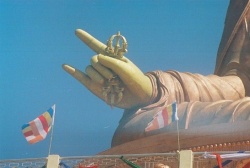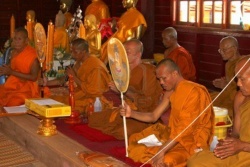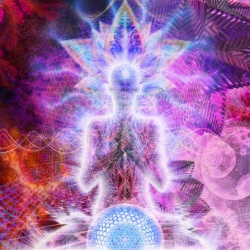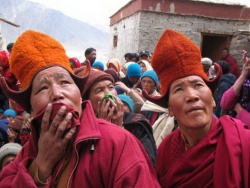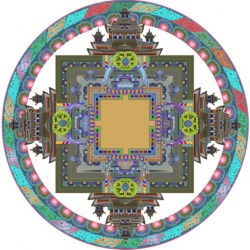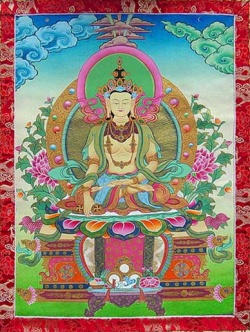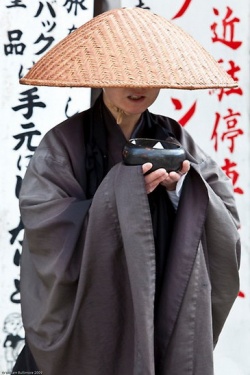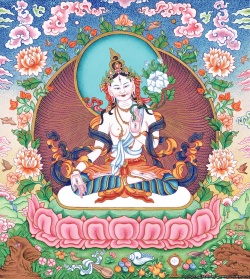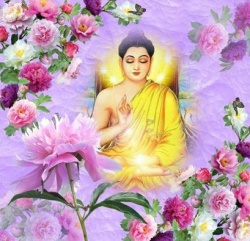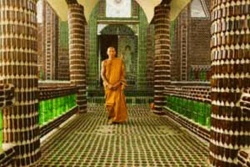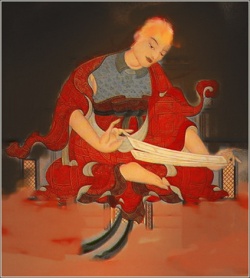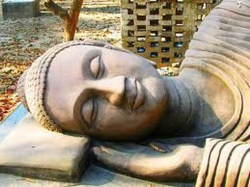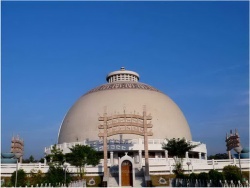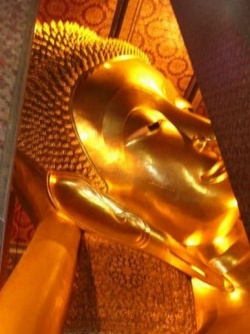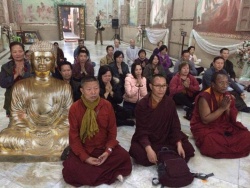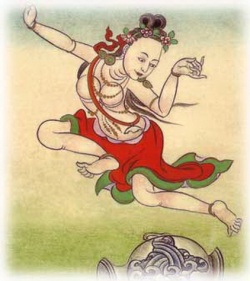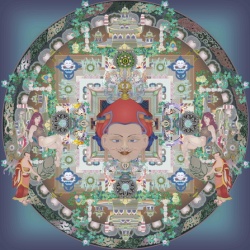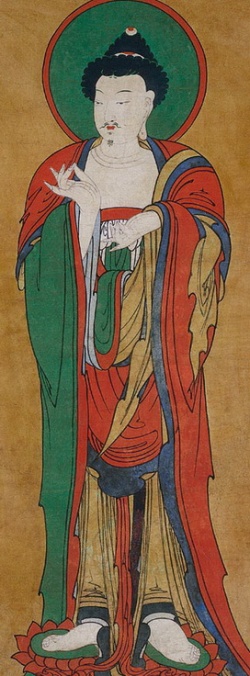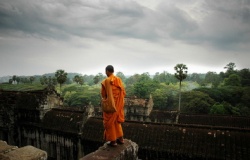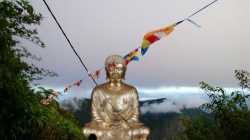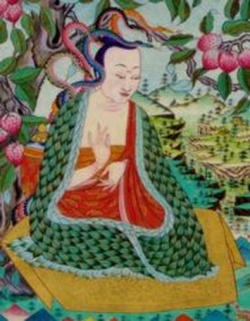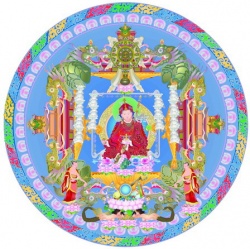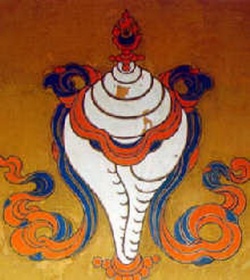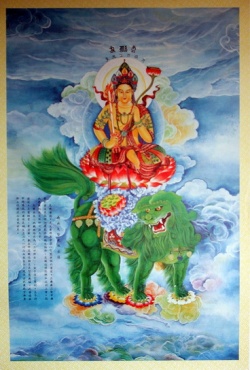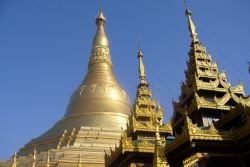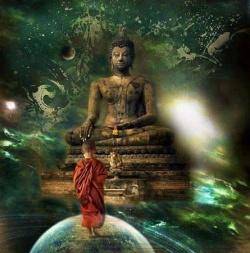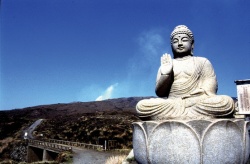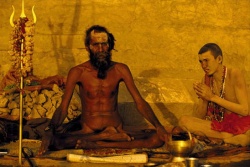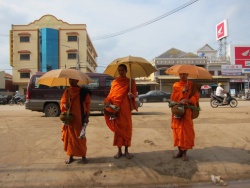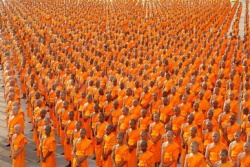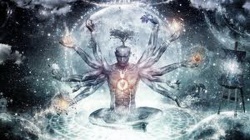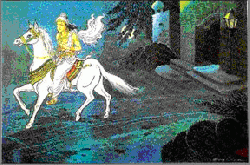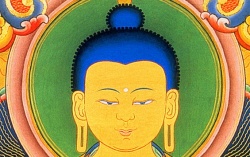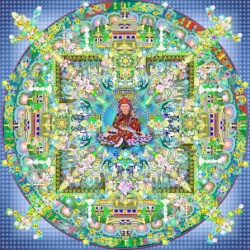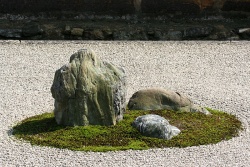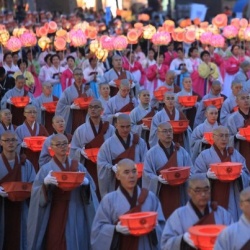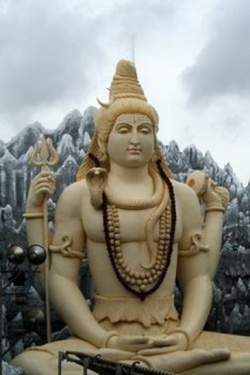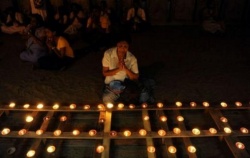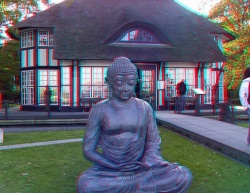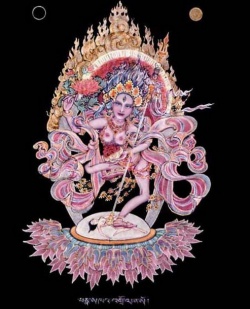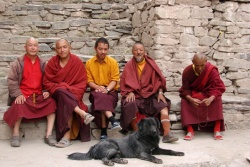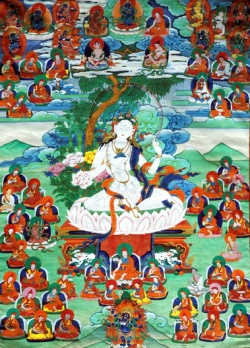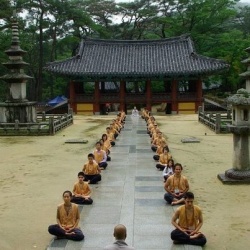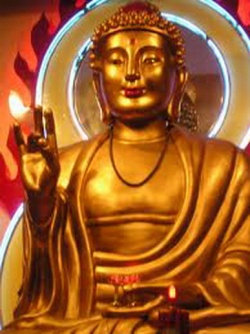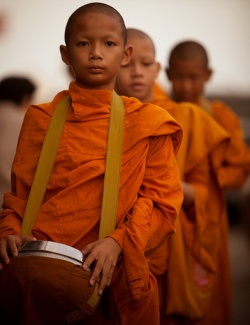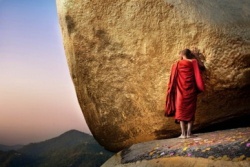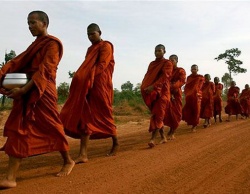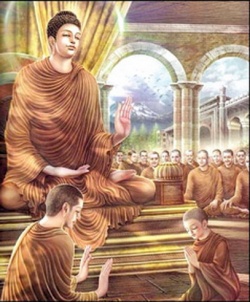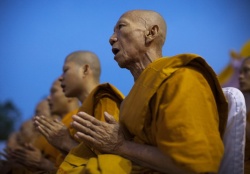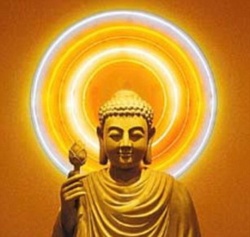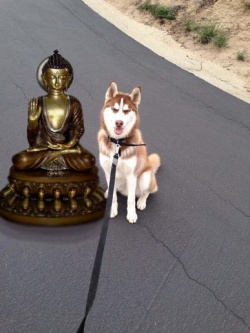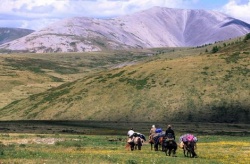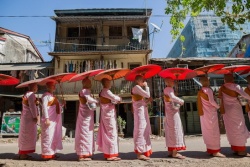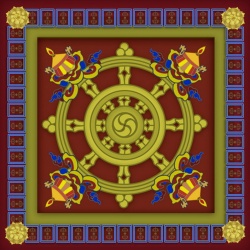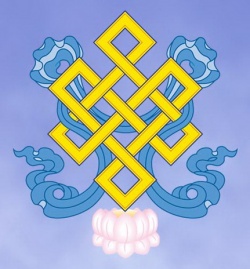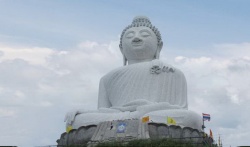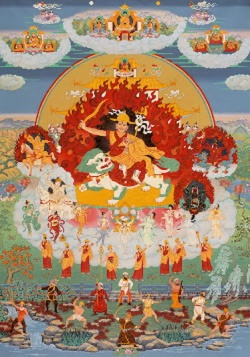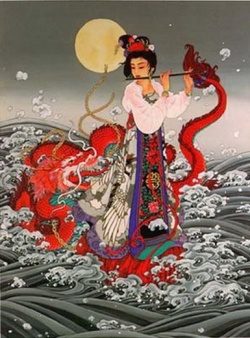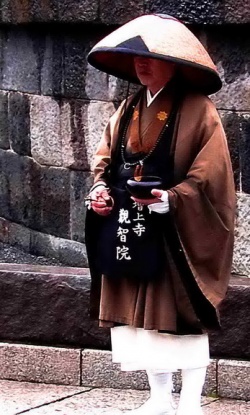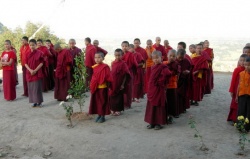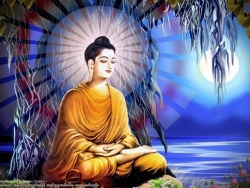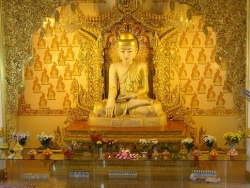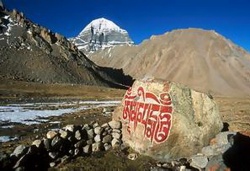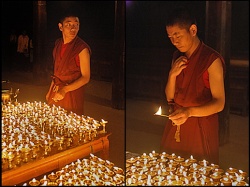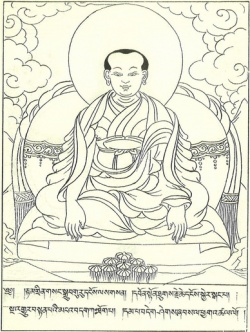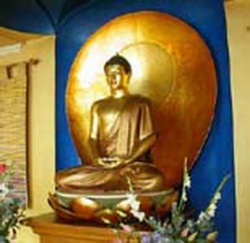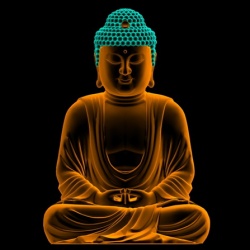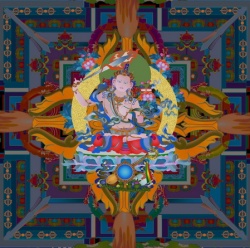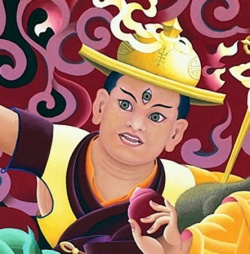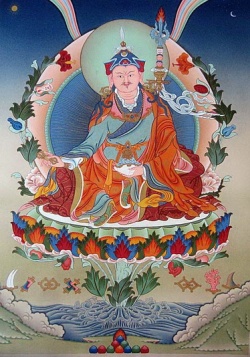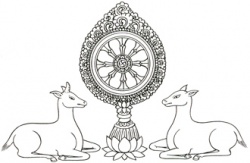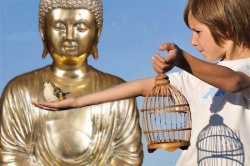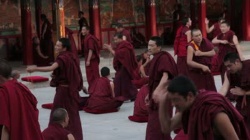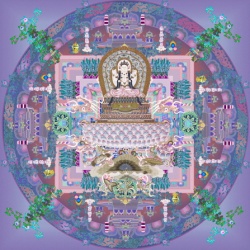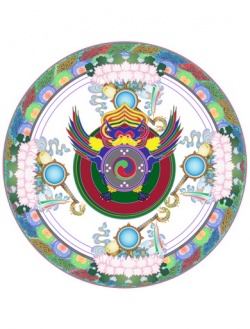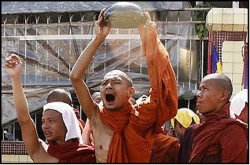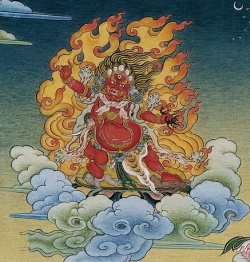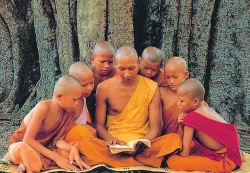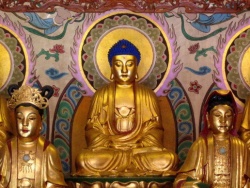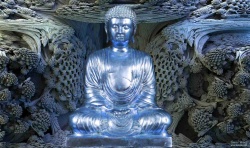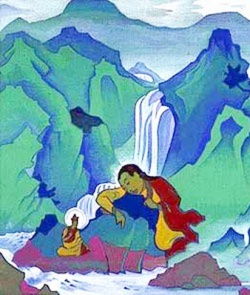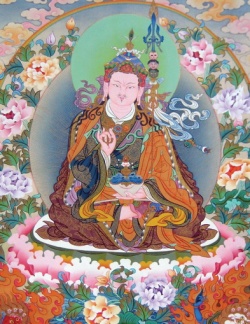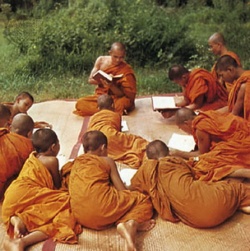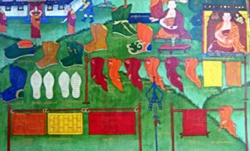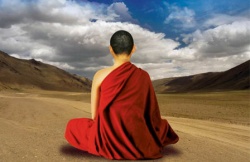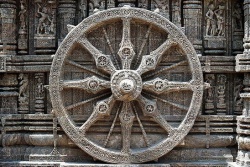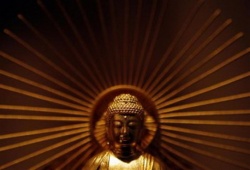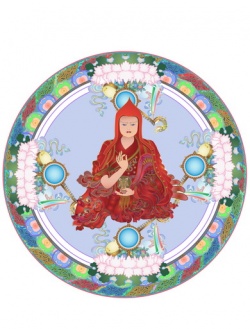Great male disciples
Upatissa (Sariputta) and Kolita (Moggallana)
At the time of the Buddha, in a village called Upatissa, there lived a well-known Brahmin family. The father, Vanganta, and mother, who was named Rupasari, had a beautiful baby boy whom they named Upatissa, after the village in which they lived. On the very same day, in the village known as Kolita, a Brahmin woman named Moggali gave birth to a son whom they named Kolita, after the village in which they lived. The two families were well-known to each other and the two boys, Upatissa and Kolita, were best friends.
Both families were wealthy and well respected. As was the custom at the time, each of the young men had a retinue of 500 companions. Upatissa travelled in luxury by palanquin while Kolita travelled by carriage. Both youths led a life of pleasure and luxury.
One day Upatissa and Kolita, together with their companions, decided to attend a festival known as the Hilltop Festival, which included dance, music and drama. At first they enjoyed the festivities and joined in the merrymaking. However, on the third day, reflecting on the fleeting nature of sense pleasures, Upatissa and Kolita decided to give up their wealth and luxuries and take to the holy life of ascetics. At about the same time that Upatissa and Kolita gave up sense pleasures, Prince Siddhattha married Princess Yasodhara.
On hearing of their renunciation some of their companions joined them. Upatissa and Kolita decided to study under the well-known Ascetic Sanjaya. Before long they had learned everything that Sanjaya could teach. Realizing that they had not found the truth they were seeking, Upatissa and Kolita decided to seek other teachers and learn their doctrine in search of the Truth. The friends parted after deciding that they would come back and teach the other, if either of them realized the enlightenment they were seeking.
Upatissa was still searching for a teacher when he saw a monk seeking alms for his noonday meal. The serenity and bearing of the monk impressed Upatissa. Thinking that he should not disturb the monk until after his meal, Upatissa followed him back to the forest grove where he dwelled. He then asked the monk under whom he had studied and if he could teach the doctrine of his master. The monk who impressed Upatissa was none other than Assaji, one of the first five disciples of the Buddha. Assaji informed Upatissa that he was himself a new disciple of the fully enlightened Buddha. He said that he would teach the Master’s doctrine, but that being new to the doctrine he would have to be brief.
Upatissa requested that he teach whatever he knew. Assaji then said:
"Of those things that arise from a cause
The Tathagata (Buddha) has told the cause
And also what their cessation is.
This is the Doctrine of the Buddha."
On hearing the first two lines of these four lines the spiritually advanced Upatissa attained the first stage of sainthood, Sottapanna. After inquiring as to where the Buddha dwelt he then went back to inform Kolita that he had found the Master who would show them the path to deliverance.
The moment that Kolita saw his friend he knew that Upatissa had found the path to deliverance. There was a radiance in his friend that had not been there before. Upatissa confirmed that a Fully Enlightened Being had been born on earth for the benefit of men and Devas. He then explained about His meeting with Assaji and repeated the four lines he had heard. On hearing the four lines Kolita too attained Sotapanna.
Kolita was now anxious to meet the Master. However, Upatissa suggested that they should first go back and inform Sanjaya that a Fully Enlightened Being had appeared so that he too could benefit by the Doctrine. The two friends went back and informed Sanjaya.
Sanjaya, however, did not want to go back to being a student. He had a large retinue and was a respected teacher. Blinded by vanity and ignorance he disregarded the pleas of his former students. Sanjaya realized the wisdom of the Buddha and he acknowledged the supremacy of the Buddha. He asked, "Are there more wise men or fools on this earth?" When Upatissa replied that there were more fools than the wise Sanjaya said, "Then let the wise go to the Buddha. Let the fools come to me."
Upatissa and Kolita left Sanjaya and set off towards Rajagaha, where the Buddha was residing in the bamboo grove. About half of Sanjaya’s pupils decided that they would join Upatissa and Kolita and follow the Doctrine of the Buddha. The text says that Sanjaya was so upset at seeing his retinue dwindle that he was stricken with illness and vomited hot blood.
Upatissa and Kolita approached the Buddha and requested permission to be ordained. The Buddha ordained the two and preached the Dhamma. On hearing the Dhamma all of their retinue attained Arahanthship and joined the order. It took Kolita a week with further instruction from the Buddha and Upatissa two weeks of concentrated effort to realize the Truth. After ordination Upatissa was known as Sariputta and Kolita as Moggallana.
The Buddha then appointed Sariputta as His first chief disciple and Moggallana as His second chief disciple. The roles of the chief disciples are very important. They helped the Buddha with His growing congregation and had three main functions to perform as follows:
- To help the Buddha in the consolidation and teaching of the Dhamma for the benefit of men and Divine beings.
- To be a role model for the Sangha (monks and nuns).
- To supervise the training and administration of the Sangha.
When Sariputta and Moggallana were appointed as the chief disciples there arose a dispute among the Sangha. Even though the Noble Order was young, the Buddha had many Arahanths in His retinue of monks. The five monks who were His first pupils – Kondanna, Bhadhiya, Vappa, Mahanama and Assaji, Yasa and his fifty-four friends, the three Kassapa brothers, and many others who were senior to Sariputta and Moggallana. Why had the Buddha not selected one of them? The Buddha then explained that He had not selected His chief disciples. All that He had done was to appoint the persons who had many aeons ago aspired to these positions and worked tirelessly, performing meritorious deeds, to fulfil their aspiration. The fruits of their labour were being fulfilled under His order.
And so we go back 100,000 world cycles and one incalculable period in time to the era of the Buddha Anomadassi, the 18th Buddha prior to the Gotama Buddha. Sariputta at that time was known as Sarada, and Moggallana as Sirivaddhana. Sarada, unsatisfied with his luxurious life of wealth and pleasures, had adopted the life of an ascetic. Inspired by the radiance of the Anomadassi Buddha, he had prepared a canopy of fragrant flowers which he held above the Buddha to form a fragrant arbour. The Anomadassi Buddha, accompanied by His chief disciples, Nisabha and Anoma, attained a higher meditative stage, which He retained for a week. Sarada was so inspired by the Anomadassi Buddha that he remained thus, holding the fragrant canopy, so as not to disturb the Buddha. The Buddha Anomadassi, seeing the merit of Sarada and desiring to inspire Sarada to further heights, instructed Nisabha to dispense the Dhamma to Sarada and the devotees who were present. So inspiring were the Dhamma and the deportment of the chief disciple that Sarada paid homage to the Buddha Anomadassi and aspired to be the first chief disciple of a future Buddha. The Buddha Anomadassi looked into the future and seeing that his aspiration would be fulfilled, prophesied that 100,000 world cycles and one infinite period into the future, Sarada would be the first chief disciple, by the name of Sariputta, of the Gotama Buddha.
Sarada then urged his friend to perform meritorious deeds and to aspire to be the second chief disciple of the Gotama Buddha. Inspired by his friend, Sirivaddhana built an alms hall, provided meals and robes to the Anomadassi Buddha and His retinue of 100,000 monks and aspired to be the second chief disciple of the Gotama Buddha. The Anomadassi Buddha, seeing that Sirivaddhana’s aspiration would be fulfilled, prophesied that he would be the second chief disciple, named Moggallana, of the Gotama Buddha.
The knowledge, wisdom and abilities of the Buddha were incomparable. There was no one in the Sangha who could take His place or substitute for the Teacher. However, the combined qualities of the two chief disciples complemented those of the Buddha. Sariputta, who was foremost in wisdom, was steady and focussed his energies on leading as many persons as possible to the first stage of sainthood, Sotapanna (also known as stream enterer). This was because once they had entered this stage they would move forward and reach the other stages within seven more births. There was no longer the danger of their falling back or obtaining birth in an unhappy realm. Sariputta felt that he should place as many persons as possible in the Path. Moggallana, the more aggressive of the two, was foremost in psychic powers. Feeling that even one more rebirth was one too many, Moggallana concentrated his efforts on taking the devotees from Sotapanna to Arahanthship. The two friends continued to work together as one, each drawing on the strengths of the other, for the betterment of men and gods.
The Buddha had the deepest respect and regard for His chief disciples and used them as an example for His monks. He encouraged His monks to associate with and emulate the chief disciples by saying:
"Associate, O monks, Sariputta and Moggallana
and keep company with them.
They are wise bhikkhus
and helpers of their fellow monks..."
6. Sariputta
Sariputta was the first (right) chief disciple of the Buddha and foremost in wisdom. His special task was the detailed analysis and systematisation of the doctrine. Because of his deep insight of the ultimate Truth he was responsible for drawing out the subtle implications of the Dhamma and for explaining the meaning of complex teachings.
In addition to his wisdom, Sariputta was well-known for his patience, compassion, humility and helpfulness to others. Not only did he help the community and the monks in the Dhamma, but he also provided material help and comfort. When the monks left for their alms round early in the morning Sariputta did not join them. Instead, he stayed in the monastery and made sure that everything was in order. If one of the novice monks had forgotten to sweep out a room or if any item was disarranged Sariputta put it in place and swept the premises. He wanted to ensure that the monastery should at all times be in order so that visiting devotees would not have a negative impression of the Order.
Sariputta’s Caring
He then visited the sick hall and provided comfort and medicine for the monks who were sick. Tending a sick monk named Tissa that everyone had rejected, the Buddha had said, "Those that tend the sick tend me (follow my teachings)." Sariputta, reminding the monks of this, encouraged the novice monks to help with the caring and comforting of the sick. If any of them required medicine that was not available on site, he arranged for it to be obtained. It was only after such duties were taken care of that Sariputta went on his alms round.
There are many documented instances of Sariputta’s ministering to the sick. His instruction and comfort to Anathapindika are noteworthy. Sariputta helped Anathapindika on two occasions. The first was when he was sick and in excruciating pain. Sariputta had reminded Anathapindika that he was a Sotapanna and as such on the path to enlightenment. He could not fall away from the Dhamma or obtain rebirth in one of the unhappy plains. These words relaxed Anathapindika’s mind and gave him great happiness. The excruciating pain disappeared. So grateful was Anathapindika to Sariputta that he offered him the rich meal that had been prepared by his servants to tempt him to eat.
The second instance was at Anathapindika’s deathbed. Anathapindika, who had a lot of confidence in Sariputta and respect for him had requested his presence ‘out of compassion for him’. Sariputta, accompanied by Ananda, had come and given an inspiring sermon on non-attachment. Anathapindika was moved to tears by the profound discourse, the likes of which he had never heard before. Shortly after, Anathapindika died and was reborn in the Tusita heaven as a Deva. That night he came in splendour to Jetavana to praise the glory of the chief disciple. Saluting the Buddha, he said:
"Sariputta truly is endowed with wisdom
With virtue and with inner peace,
Even a monk that has gone beyond
At best can only equal him."
The next morning the Buddha told His monks of His visitor and what he had said, without identifying the Deva. Ananda immediately identified Anathapindika correctly by saying that the Deva must be Anathapindika, reborn as a Deva, as he had great respect for and confidence in Sariputta.
Sariputta’s Humility
Sariputta’s humility is also documented in the text. When travelling with the Buddha he did not feel that as the first chief disciple his place should be next to the Buddha. Instead, he trailed behind, helping the sick and infirm monks who usually lagged behind. In fact, because of his immense compassion and caring, on one such instance Sariputta was the last to arrive. As all the good accommodation had been taken, Sariputta slept in a tent made of robes. When this was brought to the Buddha’s attention He said that accommodation should be arranged based on seniority in the order and dispensed the Tittira Jataka, where in a previous birth the Buddha and His chief disciples had similarly decided that the three of them would pay homage and obeisance to the most senior member.
On another occasion a seven-year-old novice monk brought to Sariputta’s attention the fact that his inner robe dragged below his outer robe. Moving aside, Sariputta adjusted his robe, then saluted the young monk and asked, "Now is it correct, teacher?" The Milindapanha documents Sariputta’s account of this incident as follows:
"If one who has gone forth this day, at age seven
Should teach me, I accept it with lowered head;
At sight of him I show my zeal and respect:
May I always set him in the teacher’s place."
Sariputta’s respect for his teacher Assaji who first taught him the Dhamma is an example that all should follow. Each night before sleeping Sariputta would pay obeisance to the Buddha. Then he would look around, prostrate himself and worship a direction. Observing this, the monks informed the Buddha that Sariputta had taken to worshiping the different directions (north, south, east and west). The Buddha corrected their assumption by saying that each night Sariputta looked with his divine eye to see in which direction his first teacher, Assaji, was residing. Then, after paying obeisance to him, he slept placing his head in that direction, careful to ensure that his feet were not in the direction in which Assaji was residing.
The honouring of one’s teachers is an integral part of the Buddha’s teaching. The Nava Sutta instructs that one should honour one’s teacher, especially those who teach the nectar of the Dhamma. The Sutta starts as follows:
"As the Devas pay devout homage to Indra1,
So should one revere the person
Through whom one has learnt the Dhamma."
Sariputta’s Patience
Sariputta’s patience and forbearance are also legendary. A group of men were praising the noble qualities of the elder when a young Brahmin challenged them saying that the reason Sariputta had never shown anger was because he had never been provoked. To prove that Sariputta, like others, would resort to anger, he walked up behind the elder and dealt him a resounding blow. Sariputta said ‘What was that?’ and then, without even turning around to find out who had hit him, continued walking. The Brahmin was overcome with guilt and shame at his conduct. Falling on his knees he begged pardon and told Sariputta how he had hit him to provoke anger. Sariputta then forgave the Brahmin. The Brahmin, not satisfied with a verbal pardon, asked Sariputta to come to his home for the noonday meal to show that he bore no malice towards him. Sariputta accepted the invitation.
After the meal, as Sariputta was leaving, he saw that a mob of angry supporters had gathered with sticks and stones to punish the Brahmin. They had witnessed the Brahmin’s treatment of the elder whom they loved and respected. Sariputta asked them what the commotion was about. When informed he asked, ‘Whom did the Brahmin strike, you or me?" On being told that it was the Elder whom the Brahmin had struck he dispersed the angry crowd by saying, "I have pardoned him. What cause is there for anger when I whom he struck feel none."
Sariputta’s caring, compassion and humility won him many friends. He was the chief disciple of the Buddha, second in wisdom to the Buddha. But he was humble, caring and compassionate. He also did not in any way use his position for special treatment. In addition to his close friendship with Moggallana, his childhood friend, he had a close relationship with Ananda, the Buddha’s personal attendant.
Sariputta, who felt that as Chief disciple he should be attending to the needs of the Buddha, was deeply grateful for the respect, care and attention that Ananda lavished on the Buddha. In turn, Ananda was deeply respectful of the chief disciple of the Buddha who helped to administer and train the Buddha’s large following. When Ananda gave ordination to novice monks he took them to Sariputta for higher ordination. Similarly when Sariputta gave ordination to novice monks he took them to Ananda for higher ordination. In this way the two great elders shared a large congregation of monks.
Ananda also, with the Buddha’s permission, often kept choice robes that he received for Sariputta. In the same manner, Sariputta passed on to Ananda choice offerings that had been made to him. Once Ananda received a very expensive robe from a wealthy Brahmin and, with the Buddha’s permission, kept it for ten days for Sariputta’s return. The other monks commented on this deep friendship, saying, "We can understand Ananda, who has not as yet attained Arahanthship, feeling such deep affection for Sariputta, but how is it that Sariputta, who is free of taints, should reciprocate?" The answer, of course, was that Sariputta’s attachment was not a worldly attachment but a love and respect for Ananda’s virtues. It is also because Arahanths have not eradicated samsaric virtues (vasana gune). It is only the Buddha who has eradicated vasana gune.
Sariputta must have been a stimulating companian for he was sought after by many. What attracted people to him was his deep caring for others, his enormous patience and his exemplary behaviour. When Sariputta entered the meditative stage on the void, even the Devas came to pay homage to him. The following is Maha Kassapa’s praise of the elder:
"These many Devas, powerful and glorious,
Ten thousand (Devas), from Brahma’s company,
Stand with joined hands worshipping him,
Sariputta, wise marshal of the Dhamma,
The great meditator in concentration.
"Homage to you, O thoroughbred man,
Homage to you, O supreme man..."
-- ( Theragatha 1082-1084)
Despite the fact that he had a large following and was well-respected, Sariputta had difficulties convincing his mother, Rupasari, of the Truth, as she had been taught from birth the doctrine of the Brahmins. Sariputta had three brothers, Cunda, Upasena and Revata, and three sisters, Cala, Upacala and Sisupacala. All six took ordination under the Buddha and attained Arahanthship. Cunda was in later years Sariputta’s attendant. Despite the fact that Rupasari had such distinguished children in the Order, she herself was a non-believer, deeply set in Brahmin rites and rituals. In fact, she had not wanted her youngest son, Revata, to be ordained, and had planned a marriage for him at a very young age to prevent him from entering the order. However, on his wedding day, when Revata viewed the very old grandmother of his bride-to-be, he became disillusioned and, realizing the impermanence of all things, ran away from the wedding to the monastery to be ordained. His three sisters married, but gave up the household life and became nuns. Their children too entered the order.
None of her children or grandchildren, however, could influence Rupasari. When Sariputta visited the city of his birth with a large gathering of monks, he came to his mother’s house for alms. His mother, whilst offering them food, insulted him in front of all the monks by berating him. She said, "O you, eater of others’ leavings. When you fail to get food you go from house to house among strangers, licking the leavings from the back of their ladles. And so it was for this that you gave up eighty crores of wealth. You have ruined me. Now go on and eat." She then went on to berate the monks for having her younger son as an attendant by saying, "So you are the men who have made my younger son your page boy". Sariputta, however, did not say a word. He took his food in silence and returned to the monastery.
Rahula, who had been among the retinue of monks, related this incident to the Buddha. Thereupon the Buddha praised Sariputta in front of the assembly of monks by saying:
"He that is free from anger,
Who performs his duties faithfully,
He that guards the precepts and is free from lust,
He that has subdued himself,
He that wears his last body -
He it is I call a Brahmin (Arahanth).
-- (Dhammapada 400)
We can all learn from Sariputta’s great patience, forbearance and humility. The Buddha has instructed us on the respect we should have for our mothers. Sariputta’s exemplary behaviour is one that we should all follow.
Sariputta’s Enlightenment
Sariputta attained supreme knowledge whilst listening to a discourse that the Buddha was addressing to Dighanakha, Sariputta’s nephew. The Buddha was teaching the comprehension of feeling and began by explaining the nature of the body. He then asked Dighanakha to contemplate the body so that desire and concern for the body should be abandoned. He then went on to explain the impermanence of all feeling and the doctrine of dependent arising. Sariputta, who was fanning the Buddha, listened to the discourse and describes his attainment of Arahanthship as follows:
"The Blessed One, The Buddha, The One with Vision,
Was teaching the Dhamma to another.
Whilst the Dhamma was being taught,
I lent an ear keen on the goal.
That listening of mine was not in vain,
For I am released free from cankers."
-- (Theragatha 995-996)
The Buddha repeatedly praised and reinforced Sariputta’s administration and handling of the monks. There is, however, one occasion on which the Buddha mildly admonished Sariputta. Sariputta had taught the Brahmin Dhananjani at his deathbed and ensured rebirth in a Brahma realm by teaching him about the four Brahma Vihara: Metta (loving-kindness), Karuna (compassion), Mudita (sympathetic joy) and Upekkha (equanimity). The Buddha questioned him as to why he had not taught Dhananjani further and helped him to destroy all cankers and attain Nibbana. Sariputta, unlike the Buddha, did not have the ability to know the spiritual capabilities of a person. As Dhananjani was a Brahmin he had ensured that his goal, which was birth in the Brahma realm, was met. The Buddha explained that as a result Dhananjani would need to obtain birth again in the human realm to achieve Arahanthship. This shows that rebirth, even in a Brahma realm, is not desirable, as one who has not attained Sotapanna could in a subsequent birth perform an unwholesome deed that could lead to rebirth in an unhappy realm. The Buddha had seen that Dhananjani would have been capable of attaining Arahanthship with some well-directed instruction.
Sariputta’s Last Days
When Sariputta’s life was nearing its end he decided that it was time to convince his mother of the Truth and place her on the Buddha’s Path. Sariputta knew that he had to first open her mind so that she would be receptive to the Buddha’s Teaching. He also knew that the only way that could be done was by shaking the confidence she had in Maha Brahma. Knowing that the Brahmas, including Maha Brahma, had great regard for him, he decided to go to his birthplace to pass away on the same bed in which he had been born. But first he had to take leave of the Buddha. With his retinue of monks he visited the Buddha and saluted Him respectfully. He then said:
"Lord of the world, O Great Sage,
I soon shall be released from life,
Going and coming shall be no more.
This is the last time I worship you,
Short is the life that now remains in me
But seven days from now I shall lay
This body down, throwing the burden off.
Grant it, O Master! Give permission, Lord!
At last the time has come for my Nibbana
Now I have relinquished the will to live.
The Buddha then asked Sariputta where he would attain final Nibbana. Sariputta replied that it would be in the Magadha country, in the village named Nalaka (Upatissa). The Buddha then asked Sariputta to dispense the Dhamma to his younger and elder brothers, as they would no longer have the opportunity to see a Bhikkhu like him.
The great elder then gave a discourse in which he displayed all his wondrous powers. Rising to the loftiest height of truth descending to mundane truth, rising again and again, he expounded the Dhamma directly and with similes.
He then worshipped the feet of the Buddha, embraced them and said: "So that I may worship at these feet I fulfilled the perfections throughout an incalculable period and one hundred thousand world cycles. My heart’s wish has found fulfilment. From now on there will be no more contact and feeling. Soon I will enter the City of Nibbana the unaging, peaceful, blissful and secure, which has been attained by many hundreds of thousands of Buddhas. If any deed or words of mine did not please you, O Lord, may the Blessed One forgive me. It is now time for me to go."
The Buddha then forgave Sariputta by saying, "There is nothing either by deed or words that I have to reproach you, Sariputta, for you are learned, of great wisdom, of broad and bright wisdom, of quick, keen and penetrative wisdom."
Immediately after the Buddha gave permission for Sariputta to attain Nibbana the great Earth shook and the skies tore open with a deluge of rain as if the very heavens were crying for the passing away of the great elder. The Buddha then rose and went to His perfumed chamber. Three times Sariputta circumambulated the chamber and paid reverence, and said: "It was one incalculable period and one hundred thousand world cycles ago that I prostrated myself at the feet of the Anomadassi Buddha and made the aspiration to see you. This aspiration has now been fulfilled and I have seen you. At the first meeting it was my first sighting of you. This is my last. There will be none in the future." And with raised hands joined in salutation, he reverenced the Buddha and walked backwards until the Blessed One was out of sight.
The Blessed One then addressed the Bhikkhus who surrounded Him and asked them to accompany Sariputta on his last journey. At His words all four assemblies at Jetavana left the Master alone and accompanied the great elder. The citizens of Savatthi also joined in with incense and fragrant flowers. A multitude of weeping and lamenting devotees followed the elder. Sariputta then addressed the devotees and reminded them of the impermanence of all things. "Have I not, he said, taught you of the impermanence of all near and dear to us"? He then asked everyone to go back to Savatthi, as the Master was alone and should not be left unattended.
Accompanied by a retinue of five hundred monks whom he himself had ordained, Sariputta set off for his birthplace. It took them a week to travel to Nalaka and on the way he spent one night in each of the different cities, teaching the Dhamma with compassion to the devotees for the last time. Upon entering the city of his birth he sent a message through his nephew informing his mother that he and his retinue would be staying with her for a day, and asking her to prepare his birth chamber and residence for his 500 monks.
He then walked slowly to his childhood home. Rupasari was perplexed at her son’s appearance. "I wonder," she thought, "if he has realized the error of his thinking in leaving all his wealth. Perhaps in his old age he has grown wiser and has come back to reclaim his wealth." She then went about preparing for her son and his retinue.
Sariputta approached his mother’s house and entered the bedchamber where he had been born. But he was now in great pain and very sick with dysentery. He lay down to rest whilst his brother, the novice Cunda, attended to his needs.
The four leading Devas of the Catumaharajika Heaven, seeing that the Marshall of the Dhamma was about to pass away, descended in all Their radiance to pay obeisance to the Venerable elder. Shortly after, Sakka, the king of the Tavatimsa Heaven, illuminated the whole area and descended to earth, and kneeling before the elder, paid obeisance to the Venerable One. Finally, Maha Bahama, in His full radiance, descended to earth to pay His last respects and catch a last glimpse of the elder.
Rupasari approached her son and questioned him on his visitors. "Who were the four radiant beings", she asked, "who paid obeisance to you?" Sariputta replied, "The four great divine kings, upasika." "Are you then greater than them?" asked his mother. "They are like temple attendants", replied Sariputta. "Ever since our Master took rebirth they have been standing guard over Him, swords in hand."
His mother then questioned him on his next visitor who surpassed the four kings in radiance. "That", said Sariputta, "is Sakka, the king of the Devas." "Are you then greater than the king of the Devas, dear?" asked his mother. "He is like a novice who carries a Bhikkhu’s belongings," replied Sariputta. "When our Master returns from the Tavatimasa Heaven, Sakka takes His bowl and extra robe and descends to earth with Him."
"And when Sakka had gone" asked his mother, "who was it who descended to your room, filling the room with his radiance?" "That," replied Sariputta, "is your Maha Brahma. The lord and master to whom you have been paying obeisance." "Are you then greater than my lord Maha Brahma?" asked his mother.
"Yes, Upasika," replied Sariputta, "on the day our master was born it is said that Maha Brahma received the Great Being in a golden net."
Upon hearing this the Brahmin woman thought, "How great must be the power and goodness of my son’s Master," and she was suffused with happiness, joy and confidence in the Exalted One.
Sariputta, seeing that his mother was now ready to receive the teachings of the Buddha, explained to her the Dhamma based on the virtues of the Buddha. At the end of the discourse his mother attained the first stage of sainthood, Sotapanna. Enjoying the bliss of Sotapanna, she then asked him why during all these years he had not bestowed the ambrosia of the knowledge of the deathless on her. Sariputta realized that his end was imminent. Seeing that his mother was now on the Path to Emancipation, and that she would not fall away from the Path, Sariputta requested the presence of his retinue of monks.
When the monks had assembled he asked Cunda to help him to a sitting position. And addressing the monks, he said, "For forty-five years I have lived and travelled with you. If by deed or word I caused you pain, forgive me, brethren."
And the monks replied that he had never given any cause for displeasure or pain and in turn asked Sariputta for forgiveness for any wrong they may have done. Then the elder, pulling his robe around him, lay on his right side and entered into the nine successive attainments of meditation in forward and reverse order, then passed through the four absorptions, and just as the crest of the sun was rising, at early dawn passed away to final Nibbana.
Next morning when his mother found that he had passed away she lamented at the missed opportunity to perform meritorious deeds for her son. And thus lamenting and crying at her own former folly spent the morning, for even as a Sotapanna she still had not eradicated all attachments.
After a week of ceremonies and homage a funeral pyre was built of sandalwood with rich arches of gold to cremate the elder. News of the elder’s death spread and people from all over came to pay homage and their last respects to the Marshal of the Dhamma. Throughout the night the devotees listened to discourses of the Dhamma until finally Venerable Anuruddha extinguished the glowing embers with scented water and, using a filter cloth, sifted the relics of the elder.
When Cunda, Sariputta’s attendant, informed Ananda that Sariputta had passed away and handed him his master’s robe and bowl, Ananda became weak and pale with grief over his friend. He addressed the Buddha and said, "Lord, the novice Cunda has told me that Sariputta has passed away. Then, Lord, my own body became weak as a creeper; everything around me became dim and things were no longer clear to me..."
The Buddha then questioned Ananda as to how this could be, as Sariputta had not taken any of Ananda’s knowledge or virtue with him when he passed away. The Buddha then reminded Ananda of impermanence and of the fact that He had taught him that all near and dear to us would eventually pass away.
Sariputta’s Contribution
Sariputta’s enormous contribution as the Marshal of the Dhamma can be understood by his description of his attainment of the supreme knowledge and the Buddha’s praise of the elder. Sariputta said:
"It was half a month after my ordination, friends, that I realized in all their parts and details,
the analytical knowledge of meaning,
the analytical knowledge of the doctrine,
the analytical knowledge of language,
the analytical knowledge of perspicacity.
These I expound in many ways, teach them and make them known, establish and reveal them, explain and clarify them. If anyone has any doubt or uncertainty, he may ask me and I shall explain the matter." (Anguttara Nikaya)
Sariputta, with this fourfold analytical knowledge, not only excelled in understanding the Dhamma, but also in teaching it so that others could understand. Because of his excellence in the Anupada Sutta, the Buddha declared him to be a true spiritual son and His chief assistant in "turning the Wheel of the Dhamma". The Buddha said:
"If one could ever say rightly of one that he has come to mastery and perfection in noble virtue, noble concentration, noble wisdom and noble liberation, it is of Sariputta that one could thus rightly declare.
If one could ever say rightly of one that he is the Blessed One’s true son, born of His speech, born of the Dhamma, formed of the Dhamma, heir to the Dhamma (not heir to worldly benefit), it is of Sariputta that one could thus rightly declare.
After me, O monks, Sariputta rightly turns the Supreme Wheel of the Dhamma even as I have turned it."
There are many discourses and books attributed to Sariputta which form a comprehensive body of the Buddha’s teaching. Sariputta understood in a unique way how to organize and present the rich and deep Dhamma in a lucid manner that was intellectually stimulating and inspirational. He was also responsible for the codification of the Abhidhamma that the Buddha taught in the Tavatimsa heaven to the Devas. Each day the Buddha would come back to earth to partake of His alms food and then would transmit this knowledge to Sariputta. Thus the giving of the method of the Higher Teachings was to the chief disciple who was endowed with the analytical knowledge, who then passed it on to the monks.
The Buddha’s high regard for Sariputta is seen again and again. In one instance the Buddha compared Sariputta to a crown prince as follows:
"If he is endowed with five qualities, O monks, the eldest son of a world monarch righteously turns the wheel of sovereignty that has been turned by his father. And the wheel of sovereignty cannot be overturned by any hostile human being. What are the five qualities? The eldest son of a world monarch knows what is beneficial, knows the law, knows the right measure, knows the right time and knows the society (with which he has to deal).
Similarly, O monks, is Sariputta endowed with five qualities and rightly turns the Supreme Wheel of the Dhamma, even as I have turned it. And the Wheel of the Dhamma cannot be overturned by ascetics or priests, by deities or Brahma, nor by anyone else in the world. What are those five qualities? Sariputta, O monks, knows what is beneficial, knows the Dhamma, knows the right measures, knows the right time and knows the assembly (he is to address)."
Sariputta encouraged those in the Noble Order by his wisdom and gentle ways. He said:
"Of restrained conduct, full of mindfulness,
Like a mindful one meditating with restrained intentions,
Vigilant, delighting in inward things,
With self well-concentrated,
Alone, content, him they call a Bhikkhu.
Whether eating moist or dried food,
He should be satisfied;
A Bhikkhu should wander with unfilled belly,
Eating in moderation, mindful.
Leaving four or five mouthfuls,
He should drink water;
This is sufficient for the abiding in comfort
Of a resolute Bhikkhu.
If he covers himself in the proper robe,
Which is for this purpose,
This is sufficient for the abiding in comfort
Of a resolute Bhikkhu.
Just as a rocky mountain is unmoving,
Well-founded, so a Bhikkhu,
Like a mountain does not tremble,
After the annihilation of delusion.
To a man who is without sin,
Always seeking purity,
A hair’s tip measure of evil seems
As if the size of a cloud.
I do not long for death,
I do not long for life,
I shall lay down this body attentive
And mindful.
As a frontier city is guarded inside and out
So you should guard yourselves.
Let not the opportunity pass you by,
For those who have missed the opportunity
Grieve when consigned to hell.
Calm, quiet, speaking in moderation,Calm, quiet, speaking in moderation,Calm, quiet, speaking in moderation,Calm, quiet, speaking in moderation,Calm, quiet, speaking in moderation,Calm, quiet, speaking in moderation,Calm, quiet, speaking in moderation,Calm, quiet, speaking in moderation,
Not conceited, he shakes off evil characteristics,
As the wind shakes off the leaves of a tree.
Calm, quiet, speaking in moderation,Calm, quiet, speaking in moderation,Calm, quiet, speaking in moderation,Calm, quiet, speaking in moderation,Calm, quiet, speaking in moderation,Calm, quiet, speaking in moderation,Calm, quiet, speaking in moderation,Calm, quiet, speaking in moderation,
Not conceited, he plucks off evil characteristics
As the wind plucks off the leaves of a tree.
Calm, without grief, settled and undisturbed,
Of good virtue, He should put
An end to pain.
Desire for sensual pleasure,
Malevolence, sloth and torpor,
Conceit and uncertainty,
These are the five defilements of the mind for a Bhikkhu.
Meditating, persevering,
Having subtle insight into views,
Having delight in the annihilation of grasping,
Him they call a good man.
Even the great sea, the earth, a mountain and wind,
Are not applicable in simile,
To the Teacher’s excellent release.
Keeping the wheel rolling,
Having great knowledge,
Concentrated, being like earth, water, fire,
The elder is not attached,
Is not opposed.
Having attained the perfection of wisdom,
Having great discernment and great thought,
Not dull (but) as though dull,
He always wanders, quenched.
The Teacher has been waited on by me,
The Buddha’s Teaching has been done,
The heavy load has been put down,
That which leads to renewed existence has been rooted out.
-- (Theragatha 981-984, 1000 – 1002, 1005-1008, 1010, 1012-1016)
Sariputta’s great reputation long survived him. His great work still remains today, preserved and enshrined in some of the oldest books of Buddhism alongside the words of the Buddha.
7. Moggallana
Moggallana, who was the second (left) chief disciple of the Buddha, was instrumental in preserving, cultivating and enriching the Dhamma for future generations. He was also foremost in supernormal powers. Before long he came to be known as Maha Moggallana or "Moggallana the great", so as to distinguish him from other contemporaries with the same name.
There were many monks who were highly skilled in various supernormal powers. But they each mastered only one or two of the powers. Anuruddha and the nun Sakula possessed supernormal vision or the divine eye. The monk Sobhita and the nun Bhadda Kapilani could recollect many past births. Cula Panthaka was skilled in astral travel, while the monk Sagala mastered the element of fire and Pilindi Vaccha excelled in communications with divine beings. Maha Moggallana, however, mastered all of these supernormal powers in a comprehensive manner and as such surpassed in excellence these other monks and nuns. His powers were also stronger than those possessed by the nun Uppalavanna, who was foremost among the nuns in supernormal powers.
In general we limit our knowledge to that which we can experience with the five senses. Since we are limited by the capabilities of our sense organs, we tend to perceive our limited experiences as absolute. Therefore, with confidence we look into an empty room and say that there is nothing in the room though in fact the room is teeming with life forms so small that they cannot be seen with the naked eye. Similarly, there are many sounds that we cannot hear and smells we cannot detect. In fact, it is proven that the hearing and olfactory senses of a dog are far superior to those of a human being. Despite this fact, we restrict our experience and view the truth that is perceived as absolute due to the limitations of our sense organs. The universe as experienced by the wise is much larger, as they can tap into other sources of energy with their developed mind.
Through development of the four ways of power (iddhipada), Maha Moggallana was capable of a much wider experience in space and time. His knowledge transcended the limitations and boundaries of the normal mind. By developing his mind over an infinite period of time, Moggallana achieved supernormal powers that may seem like make-believe to modern man. Some of his powers and feats have been carefully documented and preserved to help future generations understand the full potential of the mind. There were six types of supernormal powers that Maha Moggallana had developed. They have been outlined briefly with some examples as documented in the texts.
(1). Penetration of others’ minds and thought reading.
Moggallana, like the Buddha, had the ability to penetrate and read the minds of others and often helped the Buddha by using this trait. One night the Buddha sat in silence in front of an assembly of monks, observing each of the monks gathered in turn, without uttering a word. When morning dawned the Buddha addressed the assembly and said that this assembly was impure, as there was among them a monk who was corrupt.
Moggallana surveyed the minds of each of the monks gathered and saw that one of the monks was corrupt. Approaching him he asked the monk to leave. The monk refused. Three times Moggallana requested that the monk leave the assembly. Each time the monk refused. Moggallana then led him out of the assembly and closed the door. Moggalana then asked the Buddha to recite the rules of monastic discipline (Patimokkha) as the assembly was now pure. The Buddha, observing that the assembly was pure, addressed the monks with a sermon on the Monastic Discipline.
The text also refers to an incident where Moggallana had penetrated the minds of 500 of his disciples and determined that they were all Arahanths. The monk Vangisa, who was well-known for his poetic language, had immediately realized what had happened and praised Moggallana’s ability to the Buddha as follows:
"While the sage is seated on the mountain slope,
Gone beyond to the far shore of suffering,
His disciples sit in attendance on him,
Triple knowledge men who have left death behind.
Moggallana, great in spiritual powers,
Encompassed their minds with his own
And searching (he came to see) their minds.
Fully released, without attachment."
(2). Ability to hear sounds that cannot be heard by persons - Divine Ear
One evening when Sariputta came to visit Moggallana, he observed such a serene and calm expression on his friend’s face that he questioned Moggallana if he had dwelt in one of the peaceful abodes of mind. Moggallana informed Sariputta that this was not the case, that he had been engaged in a deep talk with the Exalted One. Sariputta then remarked that the Buddha was living in Savatthi while they themselves were many miles away in Rajagaha. He then asked if Moggallana had gone to the Buddha or if the Buddha had come to him. Moggallana said that neither had happened. They had, by using the divine eye and ear, engaged in a Dhamma talk on the mental faculty of energy. Sariputta, observing the supernatural powers of his friend, then proclaimed that so powerful were Moggallana’s supernatural powers that if he so wished, like the Buddha, he might be able to live through an entire aeon.
Moggallana also had the ability to hear the voices of divine beings and spirits. For example, a spirit had warned him of the impending danger to the Buddha by Devadatta, who was plotting to kill him. Moggallana also often visited the heavens and lower worlds and asked the beings that dwelt there about the actions that they had performed to obtain such birth. He then conveyed this information to his disciples to encourage them to perform wholesome deeds and refrain from unwholesome deeds.
(3). Ability to see things that cannot usually be seen by persons - Divine Eye
Moggallana often used his divine eye to perceive the whereabouts of the Buddha. He also used it to observe other beings. Once when Sariputta was seated deep in meditation Moggallana observed a demon pound his head. He then questioned his friend on how he was feeling. Sariputta replied that he had a slight headache resulting from the blow. Moggallana then praised his friend on his powers of concentration while Sariputta praised his friend on his ability to view the demon which he had not seen.
One such recorded incident occurred when Moggallana and the monk Lakkhana were descending Vulture’s Peak. Moggallana, who had observed a peta (unhappy spirit) had smiled. Lakkhana, realizing that Moggallana had viewed something that he had not, questioned him. Moggallana agreed to give his answer when they were in the presence of the Buddha.
As they approached the Buddha, Lakkhana again questioned Moggallana as to why he had smiled. Moggallana replied that he had seen a spirit shaped like a huge snake engulfed in flames, screaming whilst being chased and pecked at by vultures. Moggallana had felt compassion for the suffering being and then relief in the knowledge that he himself would never in the future have such a birth, as this was his last birth. This relief had caused him to smile. Moggallana did not think that anyone would believe what he saw unless it was confirmed by the Buddha. He then went on to explain the kammic cause for such a birth. He said that in a former birth this spirit had been a farmer. He had a field, which he was ploughing close to where a Pacceka (silent) Buddha was residing. The townsfolk often crossed his field to visit the Pacceka Buddha. This upset the farmer and he tried all kinds of methods to dissuade the people from crossing his field. The multitude of devotees, however, ignored his instructions and continued to walk over his field.
The farmer had then watched for an opportunity to observe the Pacceka Buddha leaving his residence, whereupon he had destroyed his belongings and burnt his shelter. The devotees were furious when they found out that the farmer had destroyed the Pacceka Buddha’s shelter and belongings. They vented their anger on him by battering him to death. The farmer was reborn in the Avichi hell and after many thousands of years was reborn in Vulture’s Peak as the snake ghost (peta) engulfed in flames.
The Buddha confirmed Moggallana’s sighting and story by saying that He Himself had viewed the same spirit on the day He attained enlightenment.
Like the Buddha, Moggallana could also view the law of kamma in operation. He could see persons with unwholesome deeds being reborn in peta and asura realms and those with meritorious deeds being reborn in heavenly realms. The Petavatthu documents 51 incidents and the Vimanavatthu 85 incidents that Moggallana had observed and used to help teach his disciples the effects of one’s wholesome and unwholesome intentional actions. In fact, with this ability, Moggallana drew many disciples of other teachers into the Noble Path. This resulted in many jealousies among other teachers who lost disciples.
(4). Ability to travel through space - Astral Travel
During the seventh rainy season the Buddha recited the Abhidhamma, the higher teachings, to the Devas in the Tavatimsa Heaven, for three months. Using astral travel, Moggallana visited the Buddha from time to time to inform Him of the progress of the Noble Order.
On another occasion when Moggallana was seeking the Buddha, he saw that the Buddha had visited a Brahma realm to shake the arrogance of a Brahma. A certain Brahma was under the false view that as Brahma he was above the Buddha and the Noble Order. The Buddha, seeing this and realizing the potential of this Brahma, appeared on his throne. Moggallana, seeing and realizing the Buddha’s intention, joined Him and thus subdued the pride and arrogance of the Brahma. The subdued Brahma was ready to accept the supremacy of the Buddha and His Teachings.
Moggallana also used his ability of astral travel to help Sariputta when he was sick. The doctor had recommended a medicine made of lotus stalks, which were only available in the Himalayan mountains. Moggallana immediately travelled to the mountains and obtained the medicine required to cure his friend.
It was also Moggallana who brought the Ananda Bhodi to Savatthi from Buddha Gaya. Ananda asked the Buddha what could be done to help the many disappointed devotees who travelled to Savatthi to see the Buddha, only to find that He was away attending to another in distress. The Buddha asked for a sapling from the great Bodhi tree under which He had attained enlightenment to be planted in Savatthi. He then proclaimed that the Bodhi Tree would be a symbol of the Buddha that devotees could venerate in His absence. Moggallana, using his supernormal powers, travelled to Buddha Gaya and brought the sapling.
(5). Mastery of matter- Supernormal Locomotion
The text indicates many instances where, at the request of the Buddha, Moggallana used his supernormal powers to shake people out of their inaction and non diligence in the Dhamma. On one occasion the monks residing in the mansion of Migara’s mother were negligent and slothful. The Buddha instructed Moggallana to instil confidence in them by performing a miracle. Moggallana shook the mansion by pushing it with his big toe. The monks, seeing the supernormal feat and recognizing the powers of Moggallana, went back to diligent practice and attained higher levels of spiritual development.
In another instance Moggallana observed that the King of the Heavens, Sakka, was being negligent and embroiled in sense pleasures. Travelling to Sakka’s heavenly abode, Moggallana used his big toe to shake Sakka’s mansion and thus reminded him of his mortality and the impermanence of all phenomenon. Sakka then went back to a more righteous way of life.
Once the Buddha and His retinue were going through great hardship as the rains were delayed and famine had set in. Moggallana offered to turn the earth so that the rich soil underneath would be brought up and crops harvested. The Buddha declined Moggallana’s offer saying that many innocent creatures would be killed if such an act was performed as there were many small creatures that lived in the soil. Moggallana then offered to build a road by using his supernormal powers, between the city in which they were residing and another which was lush with vegetation. The Buddha again declined, saying that they would instead weather out this famine, which would soon be over. These are the only documented instances where the Buddha declined a request made by Moggallana. In general, the Buddha, who had great confidence and respect for Moggallana, supported his decisions and requests.
(6). Transformation of form
The most famous and spectacular of Moggallana’s powers was his ability to transform himself into other beings. The power struggle and ultimate defeat of the King Cobra NandopAnanda are well-known. The Visuddhimagga describes this battle as follows. On one occasion the Buddha, with a retinue of 500 Arahanths, visited the Tavatimsa Heaven. In so doing they passed above and disturbed the divine royal snake, NandopAnanda. In anger he surrounded Mount Sineru with his massive coils and spread his huge hood so that the world below was enveloped in darkness. Several of the monks offered to subdue the enraged snake but the Buddha, realizing the powers of the divine serpent, chose Moggallana for the task. Moggallana then transformed himself into a huge snake and engaged NandopAnanda in a terrible battle. Drawing upon one power after another, appearing in various shapes, he overcame his opponent. In the last phase of the battle he assumed the form of Supanna, a celestial eagle, arch-enemy of the snake. At this point NandopAnanda retreated in defeat and Moggallana, resuming his form as a monk, brought the subdued NandopAnanda to the Buddha for an apology.
In the Jataka there are many references to Moggallana’s past births. In many birth stories the Bodhisatta, Moggallana and Sariputta had been together as brothers, friends, ministers or disciples . There are also recorded instances of other past associations. The Jataka also brings to light the strong bond between Moggallana and Sariputta. For in many instances they were associated and close friends. In general, however, Sariputta was of a higher station than Moggallana though this is more apparent when they were both in animal births. In all, more than 30 instances of their past associations are recorded in the Jataka.
Moggallana’s Enlightenment
Moggallana has left a legacy of his experiences in sixty-three verses, which are recorded in the Theragatha. The following emphasize his inwardly-directed efforts, his powers of meditation, his happiness at his friends’ emancipation, His experience of the truth of no soul and of the supernormal, and his final deliverance.
"Living in the forest, subsisting on alms food,
Delighting in the scraps that came into our bowl,
Let us tear apart the army of Death
Firmly concentrated within ourselves.
Living in the forest, subsisting of alms food,
Delighting in the scraps that came into our bowl,
Let us shatter the army of Death
As an elephant does a hut of reeds.
Then there was terror, then there was excitement,
When Sariputta, possessed of many qualities,
Had been quenched.
Truly the constituent elements are impermanent,
Subject to arising and passing away.
Having arisen, they cease,
Their quiescence is happiness.
Those who see the five elements of existence as other
And not as self,
Have pierced a subtle thing as a tip of hair
With an arrow.
Flashes of lightning fall upon the cleft
Of the mountains Vebhara and Pandava
But gone within the cleft he meditates,
The son of the peerless, Stable One.
Tranquil, still the sage resorts
To remote places for his lodgings,
A true heir of the supreme Buddha
He is venerated even by Brahma.
In but a moment I can create
Ten times a million bodies,
I am skilled in transformation,
I am the master of psychic powers.
A master of concentration and knowledge,
Moggallana, gone to perfection
A sage in the dispensation of the Detached One,
With concentrated faculties has cut off his bonds
As an elephant bursts a rotten creeper.
The Teacher has been served by me,
The Buddha’s Teaching has been done,
The heavy burden has been dropped,
The conduit to becoming has been uprooted.
The goal has been attained by me,
For the sake of which I have gone forth,
From the home life into the homeless,
The destruction of all fetters."
-- (Theragatha 1146, 1147, 1158, 1160, 1167, 1168, 1182-1186)
Moggallana’s Last Days
Even though Moggallana had supernormal powers and was an Arahanth he did not, unlike his friend Sariputta, have a peaceful death. Moggallana’s ability to see into other realms and explain the operation of the law of kamma, together with his extraordinary teaching skills, made him very popular. Many disciples of other teachers were placed in the Buddha’s Noble Path by Moggallana.
Ascetics of other sects, seeing their numbers dwindle, decided to kill Moggallana. Unwilling to perform the evil deed themselves for fear of exposure, they hired assassins to kill Moggallana. Moggallana was meditating in his hut in Black Rock on Mount Isigili on the outskirts of Rajagaha when they made the first attempt. Moggallana used his supernormal powers to escape unseen. The second time too the assassins found an empty hut. On the third attempt Moggallana’s supernormal powers momentarily deserted him. The assassins battered and crushed his bones and left him for dead.
Moggallana, however, was the second chief disciple of the Buddha. He was not going to pass away without first paying homage to the Buddha and obtaining permission for his Parinibbana. Gathering his battered body with supreme effort, using astral travel, Moggallana went to where the Buddha was residing and asked permission to die. Then, as was the custom for the chief disciple, he dispensed the Dhamma to those in attendance, performed many miracles to give confidence to the multitude gathered, and passed away to Parinibbana. Moggallana passed away two weeks after his friend Sariputta, in the month of Kattika (October/November).
The monks and disciples were outraged at the untimely death of their beloved teacher. The king ordered an investigation into the murder and caught the assassins, who informed him that they had been hired by Niganthanatha ascetics. The king then had the ascetics tortured and killed, in keeping with the laws at that time for murderers.
The devotees also asked the Buddha why Maha Moggallana had come to such a painful death. The Buddha explained the law of kamma that even an Arahanth could not avoid, and spoke of a grave crime that Moggallana had performed in a previous birth.
At the instigation of his wife, Moggallana had murdered both his parents, who were blind, by pounding them to death. His aged parents, who thought that they were being attacked by a band of robbers, implored their son, whom they loved, to save himself. Little did they know that it was their own son, who, in the guise of robbers, had committed this evil act. Moggallana suffered in hell for many thousands of years and had to die a violent death even as an Arahanth, for killing one’s parents is a grave (garuka) crime, the effects of which are not easily extinguished.
Moggallana’s ability to teach and his supernormal powers assisted him in his role of training the Sangha and the multitude. It was also Moggallana who, together with his friend Sariputta, brought the errant monks back to the Buddha when Devadatta caused a schism in the Sangha. He also assisted in the consolidation of the Dhamma and the administration of the Sangha.
8. Ananda
Ananda was one of Prince Siddhattha’s cousins. His father was Amitodana, a younger brother of King Suddhodana. As his birth brought a lot of happiness to his family he was named Ananda. He was born on the same day as Prince Siddhattha.
Ananda was ordained as a monk in the second year of the Buddha’s ministry, when he was thirty-seven years old. Shortly after, hearing a sermon by the Ven. Punna Mantaniputta, he attained the first stage of sainthood, Sotapanna. When the Buddha was fifty-five years old, Ananda became His personal attendant.
The Buddha addressed the assembled monks and informed them that He had many attendants who had assisted him periodically but none of them had been able to fulfil their duties perfectly. "It is time" he said, "to have a reliable, trustworthy attendant." He then asked if any of the assembled monks would like to be His personal attendant. All the noble ones gathered immediately responded to His request by offering their services. Ananda, however, who dearly wished to be His attendant, modestly held back, thinking, "The Buddha would surely appoint me if I were the most suitable person." The Buddha, with His divine eye, observed that many eons ago Ananda had aspired to be a personal attendant of a Buddha, the fulfilment of which was to occur during His reign. Refusing the offers of the other monks, He turned to Ananda and offered the post to him.
Ananda agreed to accept the post if the Buddha would agree to eight conditions. Four of them related to the non-acceptance of gifts and favours from the Buddha. Ananda wanted to ensure that there would be no doubts cast that he had accepted this position in order to obtain material gain. The other four related to the performance of his duties while being mindful of his own advancement in the Noble Path. The Buddha agreed to Ananda’s requests.
The fact that Ananda felt comfortable in asking the Buddha, whom he loved and respected and to whom he was loyal, for a conditional acceptance, illustrates the relationship between the Buddha and His monks and the manner in which the Buddha ran His ministry. The Buddha was the undisputed leader. But there was no fear under His reign. Monks felt free to voice their opinion and to question the Buddha at will.
In truth, the term personal attendant does not convey all the duties and responsibilities carried out by Ananda. In addition to taking care of all the Buddha’s personal needs Ananda was an executive assistant to the Buddha and helped in the management of His large retinue of monks, nuns and devotees. He also had the unique advantage of hearing most of the Buddha’s discourses and because of his unusually retentive memory, was declared the Guardian of the Dhamma.
To attain the position of personal attendant of a Buddha, one needs to aspire to the position and perform many meritorious deeds over a period of 100,000 world cycles. Ananda made this aspiration 100,000 world cycles ago, at the time of the Buddha Padumuttara. At that time he was born as Sumana, the younger half-brother of the Bodhisatta Gotama (known at that time by the name Jatila). He provided the requisites during the three months of the rainy season to the Padumuttara Buddha and His retinue of 100,000 monks. He then aspired to be the personal attendant of a future Buddha. The Buddha Padumuttara looked into the future and saw that this aspiration would be fulfilled. He informed Ananda that in 100,000 world cycles he would be the personal attendant of the Buddha Gotama. From this time onwards Ananda continued to perform meritorious deeds to fulfil his aspiration.
In addition to being the Guardian of the Dhamma, Ananda was well-known for two other important events that he initiated. They were the planting of the Ananda Bodhi and the founding of the order of the nuns.
Many persons came to Jetavana to pay homage to the Buddha and to learn His teachings. Sometimes when they came, the Buddha was away helping a person in distress. As many had travelled long distances to see Him and were disappointed, Ananda asked the Buddha what could be done to help these disappointed devotees.
The Buddha then asked Ananda to bring a sapling from the Bodhi Tree in Buddha Gaya and plant it in Jetavana. He then said: "In my absence, let my devotees pay homage to the great Bodhi Tree that gave me protection during enlightenment. Let the Bodhi Tree be a symbol of my presence. Those who honour the Bodhi Tree would in essence be honouring and paying homage to me."
Ever since that time, Buddhists from all over the world have venerated the Bodhi Tree as they would the Buddha, with scented water, flowers and incense. Many uninformed persons have misunderstood this symbolic action by saying that Buddhists worship trees. The Buddha statue, the Bodhi Tree, the relics of the Buddha, are but symbols of the Buddha that people use to focus the mind on the compassionate and serene qualities of the Buddha. The veneration of the Buddha provides the tranquillity and peace of mind that many people cannot readily acquire to meditate, study, and listen to His teachings.
It was at Ananda’s request, on behalf of Maha Pajapati, that the Buddha instituted the order of the nuns. The Buddha had initially refused Maha Pajapati Gotami’s request to be ordained. It was after Ananda’s question as to whether women were incapable of reaching spiritual heights and the Buddha’s reply that women were as capable as men of reaching spiritual heights, that the Buddha had agreed to the formation of the order of the nuns. As such, women had a special regard and respect for Ananda. This, together with his pleasing nature, made Ananda very popular. It is said that there were none who spoke ill of Ananda or were envious of him despite his honoured position and proximity to the Buddha.
The documented past life stories of Ananda reflect that he was seldom a god (unlike his stepbrother Anuruddha) and seldom an animal (unlike his cousin Devadatta). Ananda was often a human and in many births was the brother of the Bodhisatta.
Even though Ananda was very learned and knowledgeable, he only reached the first stage of sainthood, Sotapanna, during the lifetime of the Buddha. His deep attachment to the Buddha prevented him from attaining Arahanthship. As a result, he was not aware of the exact moment when the Buddha passed away. Thinking that the Buddha had attained Parinibbana, he informed his stepbrother Anuruddha. Anuruddha, who was an Arahanth, observing with his divine eye that this was not the case, clarified to Ananda that the Blessed One had not yet passed away. He had reached a meditative stage known as Cessation of Perception and Feeling.
Shortly after the Buddha’s Parinibbana, on the day of the First Council of the Dhamma, (Sangayana) Ananda attained Arahanthship. Ananda was designated by the Buddha as the leader in five categories. They were:
Erudition
Retentive memory
Good behaviour
Steadfastness
Ministering of care
Thirty of Ananda’s verses have been preserved in the Theragatha. The following illustrate his encouragement to associate with good friends and those well-versed in the Dhamma.
"A clever man should not make friends
With a malicious man, or an angry man, or an envious man,
One delighting in (others’) misfortune;
Contact with a bad man is evil.
A clever man should make friends
With a man of faith, a pleasant man,
With wisdom and great learning;
Contact with a good man is fortunate.
See the painted puppet
A heap of sores, a compounded body, diseased,
With many bad intentions,
For which there is no permanent stability.
Desiring understanding of the doctrine,
One should associate with that disciple of the Buddha,
Who has great learning, is expert in the doctrine,
Possesses wisdom, is of such a kind.
-- (Theragatha 1018-1020, 1030)
Ananda declared the following verses to inspire others to follow his example as the Guardian of the Dhamma. He also encouraged others to carefully examine and understand the teachings prior to their practice.
"82,000 teachings from the Buddha
I have received,
2,000 more from his disciples;
Now 84,000 are familiar to me.
Who nothing has heard and nothing understood (those void of Dhamma)
He ages only oxen-like
His stomach (body) only, grows and grows
But his insight deepens not.
Thou follow him who has heard much
Then what is heard shall not decline.
This is the tap-root of the holy life;
Hence a Dhamma Guardian you should be!
Knowing what comes first and what last
Knowing well the meaning too,
Skilful in grammar (analytical knowledge) and in other terms
The well-grasped meaning he examines.
Keen in his patient application
He strives to weigh the meaning well.
At the right time he makes the effort
And inwardly collects his mind."
-- (Theragatha 1024,1025,1027-1029)
Ananda passed away at the age of one hundred and twenty. The Dhammapada states that as people on both sides of the River Rohini wanted his relics, Ananda preached the Dhamma to the people while seated in the air in the middle of the river and wished that his body would split in two with one part falling on one bank of the river and the other part on the other bank of the river. He then entered the ecstatic meditation on fire. Flames instantly issued from his body and, as willed, one portion of his relics fell on one side of the river while the other portion fell on the other side. The people then enshrined his relics in stupas so that they could honour him.
Ananda’s greatest contribution to the Dhamma occurred three months after the Parinibbana of the Lord Buddha. The Buddha had declared Ananda as the guardian of the Dhamma because of his retentive memory. At the First Sangha Council, Ananda, under the direction of Maha Kassapa, led the five hundred Arahanths in the recitation of the Teachings and helped in the codification of the Dhamma. This method of preservation of the Dhamma was used again in later years. The second Sangha Council was led by one of Ananda’s pupils.
9. Maha Kassapa
In the district of Magadha, in a village known as Mahatittha, there lived a wealthy Brahmin couple named Kapila and Sumanadevi. They had a son whom they named Pipphali Kassapa.
As was the custom at that time, when he came of age his parents looked for a suitable girl for him to marry. Pipphali, however, was not interested in marriage and informed his parents that he would look after them until they passed away and then take to the life of an ascetic. His parents were not happy with this decision and insisted that he should select a suitable girl. To appease his parents, Kassapa had his goldsmith make a beautiful statue of a girl out of solid gold and said that he would marry if they could find a girl who resembled the statue.
Kapila then summoned eight Brahmins, and after giving them a large sum of money and the statue, asked them to roam the country in search of a bride who resembled the golden statue, for his son.
The Brahmins were in a village named Sagala when they saw an exquisitely beautiful girl named Bhadda Kapilani who resembled the statue. They spoke to her parents and found that they were agreeable to the marriage. They then went back and reported to Kapila and Sumanadevi that a suitable bride had been found.
When Kassapa heard about his oncoming marriage to Bhadda, he decided to write to her. Explaining that he was interested in becoming an ascetic he asked her to refuse this proposal and look for a suitable match elsewhere. Unknown to him, Bhadda too had no desire to marry and had chosen instead the life of an ascetic. She too had sent a similar letter to Kassapa requesting that he look elsewhere for a bride. The letters, however, were intercepted by both sets of parents who were aware of their children’s feelings, and loving letters agreeing to the marriage were substituted.
A large wedding was arranged, and with great ceremony Bhadda was given in marriage to Kassapa. Neither one of them, however, was interested in married life. The influence of their past meritorious actions and lives as ascetics was so strong that they both decided to live a celibate life. They lived in harmony as good friends, looking after Kassapa’s old parents until they passed away as was the custom, and inherited the family wealth and estates.
Maha Kassapa’s Renunciation
One day when Kassapa was supervising the ploughing of the field in preparation for the growing season, he was shaken by a common sight that had gone unnoticed by him in the past. The ploughing had resulted in many worms and little creatures being unearthed and a host of birds, attracted by the worms, were circling his field and feasting.
Observing the destruction of many innocent creatures, Kassapa questioned his workers as to who was responsible for their suffering and death. His workers then informed him that he was responsible, as they were ploughing the field on his account. This statement had a profound effect on Kassapa. He decided that he would hand over the family wealth to Bhadda and take the life of an ascetic in search of deliverance.
Unknown to him, at about the same time Bhadda had made a similar decision. Her servants had put out some sesame seeds to dry in the sun. Little creatures had flocked around the sesame seeds and raucous birds had gathered to feast on the tiny creatures. Bhadda had seen the suffering of the little creatures and asked her servants who was responsible for their suffering and death. She too had been told that she was responsible, as it was on her instruction and for her consumption that the sesame seeds had been spread out in the sun.
Reflecting on the suffering, Bhadda decided to hand over all the family wealth to Kassapa and take to the life of an ascetic. So it was that in the evening both Kassapa and Bhadda discussed their decision to find that they were both of one mind. Talking it over they both decided to take to the holy life and seek deliverance from suffering. Shaving each others’ heads they donned the simple robes of ascetics and left their home.
When their servants and the villagers heard about their renunciation they cried and lamented and tried to dissuade the couple. Kassapa and Bhadda, however, had made up their minds. Distributing their wealth among the servants, they continued on their way. And thus they wandered, Kassapa in front with Bhadda following a few yards behind, in search of a teacher.
After some time, Kassapa reflected that it was not appropriate that his very beautiful former wife should follow him. People, he reflected, would assume that he was associated with Bhadda and would start rumours and make accusations. As they were both pure and innocent of any wrongdoing, the wrongful thoughts of the people would then cause them much suffering. Discussing his thoughts with Bhadda, he requested that she not follow him any longer. Bhadda, who agreed with his decision, separated from him at the next junction. Whilst Kassapa took the road to his right, she took the road to her left.
The text indicates that the earth trembled at this renunciation due to the purity and merit of the ascetics. The Buddha, observing the trembling of the earth, saw with his super-normal vision that one of his future great disciples was on his way to meet Him. He decided to meet Kassapa and walked down the road towards Mahatittha.
On the road between Nalanda and Rajagaha the Buddha sat down under a fig tree to await His future disciple. The moment Kassapa laid eyes on the Buddha he knew that he had found his Master. The Buddha stood in all His radiance, surrounded by an aura. Falling at the Buddha’s feet and saluting Him respectfully, Kassapa asked permission to enter the Noble Order.
The Buddha then dispensed a discourse in which He instructed Kassapa on three accounts. He instructed Kassapa in order that he may:
Train himself so as to have a keen sense of shame for doing unwholesome deeds towards seniors, novices and those of middle status in the Noble Order.
Listen, examine, reflect and absorb the teachings that are conducive to wholesome deeds.
Be mindful of the body and its thoughts and actions.
After this discourse the Master and His new disciple walked back to Rajagaha.
On the way the Buddha wanted to rest under the root of a tree. Kassapa then took his outer robe, folded it four-fold and asked the Buddha to sit on it, as His doing so would bring great benefit to him for a long time. The Buddha accepted Kassapa’s robe and commented on its softness. Hearing this, Kassapa immediately offered his robe to the Buddha by saying, "May the Blessed One, out of compassion for me, accept this robe." The Buddha then asked Kassapa if he would wear the worn-out, coarse rag-robe that He was wearing. Full of joy, Kassapa accepted the Buddha’s rag-robe and agreed to wear it. Kassapa was the only monk with whom the Buddha had exchanged robes. Though the significance of this exchange was not described in the text, it may have reminded Kassapa of an ancient aspiration to be foremost among the monks in austere practices, because he took upon himself the thirteen austere practices.
Maha Kassapa’s Aspiration
One hundred thousand world cycles ago, at the time of the Padumuttara Buddha, Kassapa was born as a wealthy landowner named Vedeha, and at that time too, Bhadda had been his wife. The Padumuttara Buddha was residing at the Khema Deer Park near the city of Hamsavati. Vedeha observed the Padumuttara Buddha appointing a monk by the name of Mahanisabha as the disciple foremost in austere ascetic practices and His third most pre-eminent disciple. Inspired by the Padumuttara Buddha, Vedeha invited the Buddha and His retinue to his home for their meals on the following day.
When the Buddha and His monks were eating Vedeha noticed that the monk Mahanisabha was walking the streets on the alms round. Vedeha invited the elder to partake of his alms at his home. When Mahanisabha refused, he took the elder’s bowl and filled it with fragrant food and handed it back to him. He then questioned the Buddha as to why Mahanisabha had not accepted his invitation to come to his home for meals. The Padumuttara Buddha then explained that many world cycles ago Mahanisabha had aspired to be foremost in austere practices, and that in keeping with his aspiration he only accepted food obtained by going on the alms round.
Vedeha was suffused with happiness and inspired by Mahanisabha. He decided that he too would like to be declared as a monk foremost in austere practices and the disciple of a future Buddha. Offering the Buddha Padumuttara and His retinue of monks meals and the requirements for seven days, he prostrated himself in front of the Padumuttara Buddha and aspired to be the monk foremost in austere practices as the disciple of a future Buddha. Seeing that Vedeha would fulfil this aspiration, the Buddha Padumuttara declared that at the time of the Gotama Buddha, Vedeha would be known as Maha Kassapa, and would be declared the third most pre-eminent monk and foremost is austere practices.
The relationship between the Gotama Buddha and Kassapa started many lifetimes ago. The Jataka stories document nineteen births in which Kassapa was related to the Bodhisatta, sometimes as his father, sometimes as his brother, and often as his teacher or friend. As such the immediate bond that formed when Kassapa saw the Buddha had deep roots. Kassapa also renewed his aspiration in the presence of succeeding Buddhas and performed many meritorious deeds over countless years. As foretold, Kassapa fulfilled his aspiration at the time of the Gotama Buddha. The Buddha appointed Kassapa foremost among the monks who persevered in austere practices.
The Buddha repeatedly praised Kassapa’s commitment to austere practices and his detached behaviour. He said:
"When Kassapa goes among families his mind is not attached, not caught up, not fettered. He thinks,"Let those who want gain acquire gain! Let those who want merit do merit!" He is pleased and glad at the gains of others, just as he is pleased and glad at his own gains. Such a monk is fit to go among families."
"When he preaches the Doctrine, he will not do so for the sake of personal recognition and praise but for letting them know the teaching of the exalted one so that those who hear it may accept it and practise accordingly. He will preach it because of the excellence of the Teaching and out of compassion and sympathy." -- (Samyutta Nikaya )
Maha Kassapa’s Practice of Austerities
Two interesting encounters with the Devas further illustrate Kassapa’s commitment to austere practices. The first is his reaction to the female Deva Laja’s ministering. Laja could remember that she owed her present splendour to an offering she had made to the great elder. Laja, who had been a poor woman, had offered parched rice to the elder with great devotion. On her way back home she had been bitten by a poisonous snake and had died. As a result of her offering she had been reborn in the Tavatimsa Heaven in great splendour.
The grateful Laja decided to sweep the elder’s cell and fill his vessels with water. On the third day he saw the Deva in all her radiance cleaning his cell. Kassapa questioned her as to what she was doing and on being told, asked her not to minister to his needs in the future as he was bent on austere practices. The dejected Laja left in great sadness. The Buddha, seeing the dejected Laja, came before her in compassion and explained to her the meritorious effects of her ministering. He then consoled her by informing her of the aspiration the elder had made.
The second instance was when Kassapa was residing in the Pipphali Cave. He had attained a meditative stage and remained thus for seven days. The elder had then set out to obtain alms for Rajagaha. Inspired by the great elder, the Devas had descended to Earth with heavenly food. Kassapa, however, had refused the nectar of the Devas saying that he preferred to give this opportunity to the poor so that they could acquire merit. The disappointed Devas returned to the heavens and told Sakka, the King of the Heavens, about Kassapa’s refusal.
When Sakka heard about Kassapa’s refusal there arose in him a great desire to wait upon the great elder. Disguising himself as a poor weaver he offered Kassapa rice. When the elder accepted the food there arose a heavenly fragrance and Kassapa was instantly aware that he had been tricked by the Deva. He then admonished Sakka for taking the opportunity to acquire merit away from the poor. Sakka then asked Kassapa if he had failed to acquire merit from this deed due to his trickery. After informing Sakka that he had acquired merit despite his trick, Kassapa continued on his alms round.
The Buddha also informed Kassapa of the virtues of ascetic life and of the benefit of practising austerities in gaining emancipation. This not only encouraged Kassapa to continue in his austere practices but also encouraged him to pass them on to others by being a role model. The Buddha said:
" Formerly, Kassapa, there were elders of the Order who were forest dwellers, living on alms food, wearing rag-robes, using only the threefold set of robes, having few wants and being contented living secluded and aloof from society, energetic, and they praised and encouraged such a way of life. When such elders or younger Bhikkhus visited the monastery, they were gladly welcomed and honoured as being dedicated to the practice of the Dhamma. Then those who welcomed and honoured those noble monks would also strive to emulate them in their way of life and this would be of great benefit to them for a long time."
"But nowadays, Kassapa, those who are honoured when visiting a monastery are not monks of austere and earnest life, but those who are well-known and popular and are amply provided with the requisites of a monk. These are made welcome and honoured, and their hosts try to emulate them, which will bring them harm for a long time. Hence one will be right in saying that such monks are harmed and overpowered by what does harm to a monk’s life." --(Samyutta Nikaya)
Kassapa, who had made the aspiration to be the monk foremost in austerities at the time of the Padumuttara Buddha, took these words to heart. In fact, on one occasion he admonished Ananda who had taken 200 novice monks to the homes of disciples before they were advanced in the Dhamma. Attracted to worldly pleasures, the novices had given up the order and gone back to the family life. Kassapa admonished Ananda for not taking care of his pupils. The wealthy often invited the Buddha and His retinue for meals. Kassapa, by going on the alms round and refusing such invitations, ensured that the opportunity of this meritorious act of giving alms was available to the poor. He stopped at every house on the path and accepted every gift with equal grace.
Kassapa’s austere life and detachment are explained by him in his verses:
"Down from my mountain lodge I came one day
And made my round for alms about the street
A leper there I saw eating his meal
And courteously I halted at his side.
He with his hand all leprous and diseased
Put in my bowl a morsel. As he threw,
A finger broke off and fell into my food.
At a wall nearby I ate my share
Not at that time or after felt disgust.
For only he who takes as they come
The scraps of food, cow’s urine for medicine,
Lodging beneath a tree, the patchwork robe,
Truly is a man contented everywhere."
-- (Theragatha 1054-1057)
On another occasion the Buddha requested Kassapa to teach errant monks. The Buddha said, "Exhort the monks, Kassapa. Either I, Kassapa, should exhort the monks, or you. Either I or you should give them a discourse on the Dhamma". These words imply the confidence the Buddha had in Kassapa, as not every Arahanth had the ability to teach in a manner that would be understood.
The text did not specify why the Buddha chose Kassapa over his chief disciples Sariputta and Moggallana for this instruction. They too were excellent teachers. It could be that this instruction was given after their passing away or just before, as the Buddha was aware that Kassapa would outlive Him, unlike his chief disciples who would pass away before He did. It could also have been because the Buddha saw in His monks a movement away from austere practices to a life of comfort and materialism. Kassapa, who led an austere life, would have been the perfect role model for the errant monks.
Kassapa often questioned the Buddha, as did the other monks. On one occasion, Kassapa asked the Buddha why, early in His dispensation, there were fewer rules for the monks and more Arahanths, while later there were more rules for the monks and fewer Arahanths. The Buddha replied as follows:
"So it happens, Kassapa, when beings deteriorate and the true Dhamma vanishes: then there are more rules and fewer Arahanths. There will be, however, no vanishing of the Dhamma until a sham Dhamma arises in the world. But when a sham Dhamma arises in the world, there will be more rules and fewer Arahanths."
"But, Kassapa, it is not a cataclysm of the four elements - earth, water, fire and air that make the Dhamma disappear. Nor is the reason for its disappearance similar to the overloading of a ship that causes it to sink. It is rather the presence of five detrimental attitudes that causes the obscuration and disappearance of the Dhamma.
"These are the five: It is the lack of respect and regard for the Buddha, the Dhamma, the Sangha, the training, and for meditative concentration on the part of monks, nuns, and male and female devotees. But so long as there is respect and regard for these five things the Dhamma will remain free of obscuration and will not disappear."
It is important to note that it is not only the Sangha that have been entrusted with the preservation of the Dhamma. Even the lay devotees can and should contribute to its preservation. In fact, each and every one of us should do our part to ensure the preservation of the Dhamma in whatever way we can to ensure the availability of the Dhamma for future generations.
Kassapa did not question the Buddha as to when a sham Dhamma would appear in the world or as to what exactly He meant by a sham Dhamma. Even though there are many traditions of Buddhism in the world they all contain the Four Noble Truths and the Doctrine of Dependent Origination which is the core of the Buddha’s teaching.
Even though the Buddha often commended Kassapa for his austere practices and detached manner, He felt deep compassion for the ageing elder. On two occasions the Buddha reminded Kassapa that now that he was old, his coarse, worn-out rag-robe may be uncomfortable against his skin and that he should now wear soft robes. He also requested him to accept invitations from householders for alms, and to live in monasteries without resorting to the alms round and dwelling in the forest. Kassapa, however, refused, saying that he had been a forest dweller and had worn rag-robes for a long time, and recommended this behaviour to others. He also said that he had few wants and that he was contented and happy with what he had, and that he had also recommended this behaviour to others. As such, he preferred to remain in the austere practices which he had on many occasions recommended to others.
The Buddha then questioned him as to why he led such an austere life and he replied that it was for his own well-being and with compassion for later generations. He said that they could then emulate his exemplary behaviour and be inspired by him. For not only did he preach austerity to others but he also exemplified it in his behaviour. The Buddha then praised him for his words and gave permission for him to remain as a forest dweller, wearing rag-robes and going the alms round, as doing so would be of benefit to men and gods.
It almost seems as if the Buddha, realizing that there would be a decline in monastic values after His Parinibbana, was grooming Kassapa for the important role he would play in the preservation of the Dhamma. The Buddha had specifically declared that there would be no successor after His passing, but that the Dhamma would be their Teacher. Even so the Buddha would have foreseen that Kassapa’s austere practices would make him a reputable, outstanding leader who would be respected and honoured by the monks. On many occasions the Buddha praised and encouraged Kassapa’s austere practices. Kassapa in turn used every opportunity to encourage his pupils away from materialism and towards the beauty of an austere life.
Kassapa describes the beauties of forest dwelling and the insight and peace it brings which lead to the penetration of the Dhamma as follows:
"These regions are delightful to my heart
When the kareri creeper spreads its flower wreaths,
When sound the trumpet call of elephants
These rocky heights delight my heart.
These rocks with hue of dark-blue clouds
Where streams are flowing, cool and crystal-clear,
With glow-worms covered shining bright
These rocky heights delight my heart.
Like towering peaks of dark-blue clouds
Like splendid edifices are these rocks,
Where the birds’ sweet voices fill the air
These rocky heights delight my heart.
With glades refreshed by (cooling) rain
Resounding with the calls of crested birds,
The cliffs resorted by the seers
These rocky heights delight my heart.
Like dark blue blooms of flax they are
Like autumn sky with dark blue clouds,
With flocks of many kinds of birds
These rocky heights delight my heart.
No crowds of lay folks have these rocks
But visited by herds of deer,
With flocks of many kinds of birds
These rocky heights delight my heart.
Wide gorges where clear water flows,
Haunted by monkeys and by deer,
With mossy carpets covered, moist
These rocky heights delight my heart.
No music with five instruments can
Gladden me so much as when,
With mind collected well
Right insight into Dhamma dawns."
Theragatha 1062-1065, 1068-1071
Maha Kassapa’s Great Contribution
Kassapa’s greatest contribution to the preservation of the Dhamma occurred after the Parinibbana of the Lord Buddha. Of the Buddha’s great disciples, only Ananda and Anuruddha were present in Kusinara when the Buddha passed away, as Sariputta and Moggalana had both passed away prior to the Buddha. Kassapa, with his retinue of monks, was travelling towards Kusinara from Pava when they met an ascetic who had with him a Mandarava (coral tree) flower. As this plant grows in the heavens Kassapa knew that something unusual had occurred. He asked the ascetic if he knew anything about the Buddha and the ascetic confirmed that the Buddha had passed away a week prior. He said that the gods and the Malla kings were paying their respects to the Buddha with incense and flowers. This Mandarava plant he said he had taken from the cremation site.
When the monks heard of the Buddha’s passing away all who had not attained Arahanthsip started to lament and cry. But there was one monk named Subhadda who addressed the other monks and said, "Enough, friends. Do not grieve, do not lament. We are well rid of the Great Ascetic. We have been in trouble by His telling us this is good, this is not good. Now we can do what we like and we do not have to do what we do not like."
The text does not indicate Kassapa’s response to these cruel words. Kassapa may have remained silent so as not to cause discord among the monks. Instead, he consoled the grieving by reminding them of the truth of impermanence that the Buddha had taught. Kassapa, however, noted this incident for he cited it when he gathered the Arahanths for the First Sangha Council.
Kassapa then made a mental aspiration that the funeral pyre would not light until he and his retinue of monks reached Kusinara. In keeping with his aspiration, the sandalwood pyre would not light. When Kassapa and his monks arrived the wood shifted to expose the sacred foot of the Buddha. With bowed head Kassapa and his retinue paid homage to the Buddha, after which the sandalwood pyre caught fire.
After the cremation and distribution of the Buddha’s relics Kassapa concentrated his efforts on the preservation of the Dhamma. Remembering Subbadda’s challenge and the possibility of moral laxity and the decline of the Dhamma, he proposed holding a Sangha Council where the Dhamma and the rules for the Sangha, the Vinaya, would be reviewed. When he shared his views with the other members of the Noble Order, they agreed.
For the First Sangha Council, Kassapa selected 500 members from the Sangha, all Arahanths except for Ananda. Ananda, who was known as the guardian of the Dhamma, was selected because of his retentive memory and detailed knowledge of the 84,000 suttas dispensed by the Buddha and His great disciples. Upali, the former barber of the Sakyan Prince, who was an Arahanth, led the Vinaya as he had been declared by the Buddha as the monk foremost in the knowledge of the monastic rules (Vinaya). All other monks were required to leave Rajagaha for the seven-month duration of the recitation. All the teachings of the Buddha and the monastic discipline were recited. The Dhamma was codified and organized into the five collections (Nikayas) and the three Pitakas: Sutta Pitaka, Vinaya Pitaka and Abhidhamma Pitaka. The first Sangha Council was held in the capital of Rajagaha, in the country of Magadha, under the patronage of King Ajatasattu, three months after the passing away of the Buddha.
Ananda, with the encouragement of Anuruddha, meditated and reached Arahanthship at dawn on the day of the First Sangha Council. He then travelled through the air using astral travel to indicate his deliverance and took his place among the other members of the Council.
After the First Council the high regard that the monks had for Kassapa grew further. He was seen as the head of the order even though the Buddha had specifically declared that there would be no successor and that when He was gone, the Dhamma would be the teacher. Before his death, Kassapa handed the Buddha’s bowl to Ananda as a symbol of the continuation of the faithful preservation of the Dhamma. Kassapa, who had generally been recognized as being the most worthy in succession, chose Ananda as being the most worthy after him.
Kassapa records his deliverance, gratitude and praise of the Master as follows:
"In the whole field of the Buddha’s following,
Except for the Mighty Master himself,
I stand the foremost in ascetic ways;
No one practises them as far as I.
The Master has been served by me,
And all the Buddha’s teaching has been done;
Low have I laid the heavy load I bore,
Cause for rebirth is found in me no more.
Gotama the Immeasurable does not cling
To robe, to food or place of lodging,
Like spotless lotus blossoms He is free from taints
Bent on renunciation He transcends the three worlds.
The four foundations of mindfulness are His neck
The great Seer has faith and confidence for hands;
Above His brow is perfect wisdom; nobly wise,
He ever wanders with all desire quenched."
-- (Theragatha 1087-1090)
Kassapa was known as Maha Kassapa (great) to distinguish him from others who had the same Brahmin name. It is said that Maha Kassapa was the only monk to share seven of the thirty two marks of noble birth that the Buddha had. In keeping with his aspiration the Buddha declared that Maha Kassapa was foremost among the monks in austere practices. He was also the third most pre-eminent monk among the Buddha’s retinue.
The First Sangha Council was extremely successful in the preservation of "The Word of the Buddha". This method, the introduction of which resulted in Maha Kassapa being called "the Father of the Dhamma" was used in subsequent years as and when required. It also led to the use of the term "Theravada" or recitation of the elders (Arahanths) being used for the Word of the Buddha. Since then there have been six more Sangha Councils under the Theravada Tradition and one Sangha Council under the Mahayana Tradition. The Second Sangha Council was held 100 years after the Parinibbana of the Buddha, in the Valukarama at Vesali, under the patronage of King K�lasoka. One of Ananda’s pupils, the Arahanth Sabbak�mi, who was 120 years old, presided over the Second Sangha Council, and 700 members of the Sangha, all of whom were Arahanths, took part. The Second Sangha Council took eight months to complete.
The Third Sangha Council was held 235 years after the Parinibbana of the Buddha in the 17th year of King Asoka’s reign, under his patronage in the Asokarama in Pataliputta. The Arahanth Moggaliputta Tissa presided over the Third Sangha Council and 1,000 members of the Sangha, all of whom were Arahanths, took part. The Third Sangha Council took nine months to complete.
About four hundred and fifty years after the Buddha’s Parinibbana, around 90 BC, the Fourth Sangha Council which was in the Theravada Tradition was held, and the Word of the Buddha was documented for the first time in Matale at the Aluvihara in Sri Lanka, under the patronage of King Vatta Gamini Abhaya (Walagambahu). Five hundred members of the Sangha, all of whom were Arahanths, took part in the Fourth Sangha Council. The Great Commentator, Buddhaghosa, who wrote the Path of Purification (Visuddhi Magga), states that the number of books written on Ola (palm) leaves was so great that when piled one on top of another they reached the height of six elephants.
The next Sangha Council, the First Sangha Council in the Mahayana Tradition was held in Kashmir about five hundred years after the Parinibbana of the Lord Buddha, under the patronage of King Kanishka (78 BC - 101 AC). The Ven. Vasumitta presided.
The Fifth Sangha Council in the Theravada Tradition was held in Mandalay in Myanmar (Burma), two thousand four hundred and fifteen years after the passing away of the Lord Buddha, in November 1871 under the patronage of King Mindon. The scriptures written on palm leaves would eventually deteriorate. To ensure the preservation of the scriptures the Buddha Dhamma was inscribed on marble slabs.
Two thousand four hundred Bhikkus led by Venerable Jagarabhivamsa of the Dakkhinarama Monastery assisted by the Venerable Narindabhidhaja and the Venerable Sumangalasami began by reciting the scriptures in the traditional manner. The joint Dhamma recitation lasted five months. Then with the help of skilled crafts men it was inscribed in seven hundred and twenty-nine marble slabs. It took seven years six months and fourteen days to complete the work. The marble slabs were placed in Pitaka Pagodas in the grounds of King Mindon’s Kuthodaw Pagoda at the foot of the Mandalay Hill. It is now known as the world’s largest book.
The Sixth Sangha Council, known as the Kaba Aye, which was of the Theravada Tradition, was held in Yangon (Rangoon) in 1954. It was sponsored by the Burmese Government led by the Honorable Prime Minister U Nu. He authorised the construction of the Maha Passana Gaha, ‘the great cave’, an artificial cave similar to the cave in which the First Sangha Council was recited. The Sixth Sangha Council was unique in that the Bhikkus taking part in it came from eight different countries. Two thousand five hundred learned Theravada monks from Mynmar, Cambodia, India, Laos, Nepal, Sri Lanka, Thailand and Vietnam graced the momentous occasion. The late Venerable Mahasi Sayadaw was appointed to question the Dhamma as required and the Venerable Bhadanta Vivittasarabhivamsa answered the questions eloquently. By this time the scriptures had been translated to the native language of all the participating countries except for India. The traditional recitation took two years. The commentaries and different scripts were also examined and reconciled where necessary. This version of the Tripitaka which was sanctioned by the entire Theravada Buddhist World is now accepted as the pristine teachings of the Buddha Gotama
The retentive powers of the minds of Arahanths developed through years and years of meditation, the Buddha’s style of teaching which was repetitive, and His instruction to memorize the Teaching so as to hand it down to others, resulted in a comprehensive text for future generations. The fact that only Arahanths were admitted to the early Sangayanas ensured that it was only those who had experienced the Truth, those who have seen the supreme bliss of Nibbana, who participated in this very important preservation. The freedom the Buddha gave to investigate, question and debate also helped, as the teachings were analysed whenever there was a conflict of opinion and corrected to ensure that it was the word of the Buddha which was preserved. Thus the Arahanth Maha Kassapa, the third most pre-eminent monk of the Buddha, often referred to as the "Father of the Dhamma", ensured the preservation of the Dhamma for future generations.
10. Anuruddha
Anuruddha was one of Prince Siddhattha’s cousins. His father, who was named Amitodana, was a younger brother of King Suddhodana. Amitodana had two consorts. Anuruddha, his brother, Mahanama and his sister, Rohini, were born from one consort. Ananda, who later became the Buddha’s personal attendant, was the son of the other consort. As such Ananda was Anuruddha’s step-brother.
Anuruddha was brought up in immense luxury. His mother, who adored him, ensured that all his wishes were fulfilled. The following story illustrates the luxury he enjoyed. One day Anuruddha, who was playing marbles with his friends, decided to bet on his winning the game. He promised fresh cakes to whoever could beat him at marbles. Luck was against him. Again and again he lost to his friends. Each time he sent a message home to his mother asking for cakes, which she lovingly provided. Finally the message came back that there was no cake. Anuruddha, who had always had everything he wanted, thought that this was a new type of cake and sent a message back asking his mother to send the no-cake to pay off his debt.
When Sakyan princes began giving up their royal lineage to follow the Buddha, Mahanama, the older of King Amitodana’s sons, felt that either Anuruddha or he should follow in the footsteps of their Great Cousin. He called his younger brother and asked him if he would like to be ordained under the Buddha. Anuruddha, however, was too attached to sense pleasure. He was well-known for his love of dance, music and luxuries. Anuruddha felt that the homeless life would be too harsh for someone brought up in the lap of luxury. Mahanama, however, convinced his brother by describing the trials he would face when conducting the duties and responsibilities he had as a nobleman. When Anuruddha realized that he would have many responsibilities to fulfill if he were to take the place of his older brother and endless rounds of rebirth in samsara where he would toil embroiled in suffering, he decided to renounce his life of luxury. He went to his mother and asked her permission to be ordained under the Sakyan Sage.
His mother, who wanted to keep both her sons with her, refused. Thinking that his friend who was heir to the throne would never give up his royal heritage, she informed Anuruddha that he could go if his friend Bhaddiya went with him. Anuruddha spoke to his friend to convince him to join the order. Bhaddiya refused, as the glory of being a future king was more appealing to him. Anuruddha did not give up. Little by little he broke down the defences of his friend. First Bhaddiya agreed to join the Holy Order in seven years. On further insistence and pleading, Bhaddiya reduced the time until finally he agreed to leave in seven days as it would take that long for him to settle his affairs and hand over the succession of the position of viceroy to his successor. On hearing of their decision Anuruddha’s step-brother, Ananda, their cousin, Devadatta, and two other Sakyan princes, Kimbila and Bhagu, decided to join them. The princes, together with the court barber, Upali, left the palace under the pretence of going to the pleasure gardens.
After travelling for some distance the princes handed their royal jewels and rich clothes to Upali and donned the simple robes of ascetics. They then instructed Upali to return to the palace with the message that the Sakyan princes had left to join the order of the Noble Ones under the great Sakyan Sage, the Buddha. Upali, however, was afraid that the Sakyans, who were a very fierce warrior race, would not believe him. He felt that he would be killed, as the Sakyans would think that he, Upali, had robbed and killed the young princes. He asked permission to go with them to be ordained under the Buddha. The princes agreed.
Together, they proceeded to where the Buddha was residing and asked to be ordained. The Sakyan princes, who were well-known for their pride and arrogance, asked the Buddha to ordain Upali, the barber who had attended them for a long time, first, so that he would then be senior to them. As such they would have to pay obeisance and respect to Upali, which would help to subdue their Sakyan pride. The Buddha complied to their request.
Before long Anuruddha developed the divine eye – the ability to see beyond the range of the physical eye. He could survey one thousand world systems (the Buddha could see, and spoke of ten thousand world systems). These world systems could be compared to modern-day galaxies. The Buddha said that each world system contained 31 planes of existence in which there were 31 different life forms, and of such world systems He viewed ten thousand. Anuruddha, however, developed his divine eye only to the extent where he could view one thousand world systems. He also had the ability to see into the past births of others and to see their place of rebirth after death.
The development of the divine eye is mundane in character. It can be developed without reaching any of the four stages of spiritual development – Sotapanna, Sakadagami, Anagami or Arahanthship. In fact, Anuruddha achieved it prior to obtaining the first stage of sainthood. As such it can be achieved by an unliberated worldling. The divine eye can be developed by one who has reached the fourth stage of mental absorption (Jhana) and takes this meditation further as described in The Path of Purification (Visudhimagga). Anuruddha often taught this skill to his students. His verses relate his experience thus:
"In fivefold concentration rapt,
The mind in peace and unified,
Inner tranquillity I gained
And thus was purified my eye divine.
In fivefold Jhanas standing firm
I knew the passing and rebirth of beings,
Their coming and their going I perceived,
Their life in this world and beyond.
-- (Theragatha, 916-917)
Despite this achievement Anuruddha had difficulties in reaching Arahanthship. His spiritual development, however, helped him to live in harmony with two other monks, Kimbila and Nandiya. These three lived alone in concentration in the Eastern Bamboo Park and met every fifth night to discuss the Dhamma. The harmony that existed between these monks became legendary. The Buddha once asked Anuruddha how he lived in peace and harmony with his two companions. Anuruddha replied, "In deed, words and thoughts I maintain loving kindness towards these venerable ones in public and in private thinking. Why should I not set aside what I want to do and do only what they want to do? We are different in body, Venerable Sir, but one in mind". The Buddha praised their harmony and held them as an example to other monks to strengthen the unity of the Sangha.
The Buddha then questioned Anuruddha on his difficulties in obtaining liberation. Anuruddha explained that he had reached a higher state of concentration in which he perceived an inner light and radiance but that the vision of light and radiance disappeared very soon and he did not understand the reason.
Describing from His own experience the Buddha then explained the eleven imperfections or hindrances that may arise and how to overcome them. Anuruddha followed the Buddha’s advice and developed further and further in refined meditative perceptions. He did not, however, reach Arahanthship.
One day Anuruddha visited Sariputta and said, "Brother Sariputta, with the divine eye I am able to perceive a thousand-fold world systems. My energy is strong, my mindfulness is alert and unconfused, my body is collected and unified. Yet my mind is not freed without clinging from the defiling taints".
Sariputta replied, "When you think, Brother Anuruddha, that with your divine eye you can see a thousand-fold world systems, that is self-conceit. When you think of your strenuous energy, your alert mindfulness, your calm body and your concentrated mind, that is agitation. When you think your mind is still not liberated from taints, that is scruples in you. Discard these three things. Do not pay attention to them. Instead, direct the mind towards the deathless." Anuruddha again went into solitude and directed his mind in earnest to remove these obstructions.
The Buddha, perceiving that Anuruddha was close to enlightenment but that he needed further instruction, appeared before him in form made by mind. The Buddha’s instruction to Anuruddha on the non-diffused helped him reach perfection. An hour after the attainment he proclaimed the following:
"He knew my heart’s intent, the Master,
He whose peer the world has not seen.
He came to me by mystic power,
With body wrought by mind.
To me when further Truths I wished to learn,
The Buddha (this last Truth) revealed:
He who delights in freedom from diffuseness,
That freedom from diffuseness taught to me.
And I who heard the blessed Dhamma dwelt,
Constantly intent to keep His rule,
The Threefold Wisdom have I made my own,
And all the Buddha’s ordinance is done."
-- (Theragatha, 901-903)
Because of Anuruddha’s development of the divine eye the Buddha declared that he was foremost among the monks who had developed the divine eye. Anuruddha had aspired to be foremost in the development of the divine eye one hundred thousand world cycles ago, at the time of the Padumuttara Buddha. On seeing the Buddha Padumuttara appoint one of His monks as foremost in the divine eye and being inspired by the character and qualities of the monk, Anuruddha decided that he would like to have such a position under a future Buddha. With this in mind he performed many meritorious deeds and aspired to be foremost in the divine eye under a future Buddha. The Padumuttara Buddha, seeing that Anuruddha’s aspiration would be fulfilled, announced that he would be foremost in the divine eye at the time of the Gotama Buddha.
After the passing away of the Padumuttara Buddha, Anuruddha approached the monk and asked him what meritorious acts he should perform to attain such a position. The monk then instructed him to light many lamps in the shrine that held the relics of the Padumuttara Buddha and to aspire that as these lamps dispelled the darkness, shedding light to the surrounding area so that others could see, may he develop the divine eye to view the many world systems and divine beings. The Theragatha states that at the time of the Buddha Kassapa, Anuruddha had lit butter lamps to honour the grave of the Kassapa Buddha and had renewed his aspiration. These and many other meritorious acts that Anuruddha performed led to the fulfilment of his aspiration at the time of the Gotama Buddha.
Twenty-three accounts of Anuruddha’s past lives have been documented in the Jataka (birth stories of the Buddha). Fifteen of these births were in the celestial realms, thirteen of which were as Sakka, the leader of the Tavatimsa heaven. It was Anuruddha as Sakka who dressed up as an old Brahmin to test the Bodhisatta further by asking for His wife, the princess Maddi, in the Vessantara Jataka. Twice as Sakka, Anuruddha saved the Bodhisatta’s life when He was in danger. It was also Anuruddha as Sakka who showed the Bodhisatta the celestial and hellish worlds in the Guttila Jataka. In the seven earthly past life stories he was often an ascetic. Only one past life story documents birth as an animal (wood pigeon). Anuruddha’s strength of character, his loyalty and his compassion to others are illustrated over and over again in these stories. In many births he had been of help to the Bodhisatta. The Theragatha also documents some of his former lives. Anuruddha, who could see into his past births, described some of them as follows:
"I know my former lives, and where and how
I lived in years gone by: among the Gods of the Thirty-Three (Tavatimasa heaven)
I stood of Sakka’s rank.
Seven times a king of men I held my sway,
Lord of the earth from end to end foursquare,
A conqueror, of Jambudipa (India) chief,
Using no force or arms I ruled by right.
Thence seven. And another seven spans of life,
Fourteen former births I recognize,
Even then in the worlds of gods reborn."
-- (Theragatha 913-915)
Anuruddha outlived the Buddha and was instrumental in ensuring that the wishes of the divine beings were met at the Buddha’s funeral. When the Buddha passed away Maha Brahma (the Brahmin creator God) and Sakka (ruler of the Tavatimsa Heaven) honoured the Buddha in verses evoking the law of impermanence to console the grieving Brahmas and Devas. The third to speak was Anuruddha, who consoled the grieving with the following words:
"No movement of breath, but with steadfast heart,
Desireless and tranquil comes the Sage to His end.
With heart unshaken by any painful feelings,
Like a flame extinguished, His mind released."
Anuruddha also encouraged and helped Ananda to attain Arahanthship prior to the First Sangha Council. Anuruddha was in charge of the Angutttara Nikaya at the first council. He passed away at Veluva in the Vajjian land with the following prediction of his oncoming death:
"The Buddha has my loyalty and love,
And all of the Buddha’s Law is done.
Low have I laid the heavy load I bore,
Cause for rebirth is found in me no more.
In Veluva, in Vajjian land, it will be
That life will reach its final term for me;
And I beneath the bamboo-thicket’s shade that day,
Free from all taints shall wholly pass away."
-- (Theragatha 918-919)
11. Maha Kaccana
In the district of Ujjeni, in the capital city of Avanti, there lived a Brahmin couple of the Kaccayana clan named Tiritavaccha and Candima. As the Kaccayana clan was one of the oldest and most respected Brahmin clans they were very well-known and respected. They had a son whom they named Kancana (one with golden hue) because of his unusually golden skin. Kancana studied the Brahmanic Vedas and when he came of age replaced his father as court chaplain.
The king whom he served was known as Candapajjota, or ‘Pajjota the Violent’ due to his explosive temper. When the king heard that a Blessed One had arisen in the world a desire arose in him to see the Buddha. He requested his chaplain to invite the Buddha to Avanti as his guest. Kancana agreed to invite the Buddha if the King gave him permission to be ordained as a monk.
With the king’s permission Kancana and seven other courtiers left Avanti and set out for Savatthi, where the Buddha was residing. Inspired by the Buddha’s teaching, all eight attained Arahanthship together with the four analytical knowledges and were ordained as monks. Kancana was known as Kaccana after ordination. Kaccana enumerated the scenic beauty of Ujjeni to the Buddha, with the intention of inviting Him to visit Avanti. The Buddha, realizing that Kaccana was quite capable of inspiring the king, his ministers and townsfolk, asked Kaccana to return to Avanti with the former courtiers.
On the way back the eight monks stopped overnight at a city named Telapanali. In this city lived two beautiful maidens. One was a rich girl who had lost all her hair due to a disease. The other was a girl who had become impoverished after her parents’ death. The poor girl, who lived with her former governess, had thick, beautiful, long hair, which was the envy of the rich girl. The rich girl had repeatedly offered to buy the lustrous hair of the poor girl for a considerable amount of money, to make a wig. The poor girl, however, had refused her offer.
When the poor girl saw the serene monks on their alms round there arose a longing in her to offer them a meal. Not having the necessary means, she cut off her hair and sold it to the rich girl. Using the money, she bought the items required to make a delicious meal and prepared food for the eight monks. So great was her devotion and happiness in this gift that the effect of her wholesome deed was instant. Her hair grew back in all its splendour to its original length.
When Kaccana returned to Avanti, he informed the king of this incident. The king then requested that the girl be brought to Avanti and made her his chief consort. After this incident King Pajjota had great confidence in Kaccana. Before long Avanti was a single blaze of saffron robes as ministers and townsfolk embraced the Buddha’s Teaching and entered the Noble Order. The queen, who was deeply grateful to the elder for her good fortune, built for him a monastery in the Golden Grove Park.
The Buddha used two methods of teaching for His monks. Often he began with a short verse, on which he then elaborated with well-organised examples and similes, and then concluded by linking it back to the opening verse by summarizing the deep contents of His message. At times, however, He gave a short message full of deep meaning, on which He did not elaborate, as He wanted His Sangha to reflect on the message and ascertain its meaning through examination and contemplation. The more spiritually advanced met this challenge with enthusiasm, as it stretched their minds and helped them to grow. But at times the novice monks could not discern the meaning of His words. The novice monks then approached Kaccana and asked him to explain the Buddha’s words. Kaccana then elaborated on the teaching and explained it in a manner that was understood by the less advanced members of the Sangha. The Buddha, when informed of Kaccana’s explanation, consistently praised him for his interpretation by saying that He Himself would have given exactly the same answer had the question been put to Him. Because of Kaccana’s analytical, organised mind and his ability to penetrate the Dhamma and then simplify the message in a manner that was easy to understand, the Buddha declared him as foremost among the monks who elaborated on short verses taught by Him. Kaccana was known as Maha Kaccana to distinguish him from other monks who had the same Brahmanic name.
As with the other titles that the Buddha gave to His Sangha, this appointment was not a chance happening. The aspiration and meritorious deeds that led to this appointment were sown many aeons ago at the time of the Padumuttara Buddha. At that time Kaccana was born to a wealthy family and saw the Padumuttara Buddha appoint a Bhikkhu as foremost among monks who explain in detail short verses declared by Him. Kaccana was inspired by the Bhikkhu’s ability and a strong desire arose in him to strive for a similar title at the time of a future Buddha. Inviting the Buddha and His retinue of monks to his home for a week, he provided them with alms and necessities. He then built a stupa with a seat, which he had inlaid with gold and fitted with a jewelled parasol, for the Buddha Padumuttara.
Kaccana then prostrated himself respectfully in front of the Buddha and aspired to be the foremost monk who explained in detail short verses declared by a future Buddha. The Buddha Padumuttara, seeing that Kaccana’s aspiration would be fulfilled, prophesied that at the time of the Gotama Buddha, 100,000 aeons into the future, he would be born to a Brahmin family by the name of Kaccana and be declared as the monk foremost in explaining in detail the short verses declared by the Buddha Gotama.
The Buddha Padumuttara also made other prophesies about Kaccana’s future births. He declared that as a result of his meritorious deeds Kaccana would be the Lord of the Gods for 30 aeons. He would then return to the human world as a world monarch named Pabhassara. Kaccana continued in samsara performing meritorious deeds and renewing his aspiration until he was reborn as Kancana in the Kaccayana clan to fulfil his aspiration.
The text also indicates the origin of his unusually beautiful, golden complexion. Shortly after the Parinibbana of the Kassapa Buddha (the Buddha who preceded our Gotama Buddha), Kaccana had donated a golden brick to make a stupa in the name of the Kassapa Buddha and had made a wish to have a golden hue like the gold he had donated whenever he was reborn. This wish had resulted in Kaccana’s skin having an unusually beautiful, golden hue.
Maha Kaccana made an invaluable contribution to the preservation of the Dhamma. His lucid explanations of deep subjects have been carefully documented and as such helped not only the contemporaries of the Buddha but following generations. The text documents well his role as a great teacher. His primary role, however, was to elaborate on the statements made by the Buddha. Compared to the other great disciples there are only a few recorded instances where he taught the Dhamma to one person individually. His explanations and teachings are clear and to the point, using an analytical approach as opposed to using similes and examples.
Kaccana begins with a short utterance of the Buddha. He then goes on to explain in detail its hidden meaning. Eight Suttas found in the Nikayas, three in the Majjhima Nikaya, three in the Samutta Nikaya and two in the Anguttara Nikaya, are especially noteworthy. There are also in the Nikayas some teachings which are directly attributed to Maha Kaccana. These teachings have a distinctive flavour revealing the mind from which they were born. They are thorough, well-rounded, balanced and meticulous. Often Kaccana explains the essence of the verse with only a few words.
A few examples of Kaccana’s skill in explaining the deep meaning of the Buddha’s words and the Buddha’s praise of his skills follow:
One day when the Buddha was seated in meditation in the Nigrodha park in Kapillavatthu, an arrogant Sakyan named Dandapani approached Him and asked in a discourteous tone, "What does the recluse assert? What does he proclaim?"
The Buddha, realizing well Dandapani’s quarrelsome nature and intention, replied:
"Friend, I assert and proclaim such (a teaching) that one does not quarrel with anyone in the world, with its gods, with its maras and its Brahmas in this generation, with its recluses, Brahmins, its princes and its people; such that perceptions no more underlie that Brahmins who abide detached from sensual pleasures, without perplexity, free of worry, free from craving, for any kind of being." (Majjhima Nikaya)
This reply was totally incomprehensible to Dandapani, who left, subdued. One monk who had not understood the meaning of the Buddha’s words inquired as to what exactly the Blessed One’s teaching was whereby one can avoid all quarrels and at the same time be free from the influence of craving."
The Buddha’s deep reply was:
"Bhikkhus, as to the source through which perceptions and notions tinged by mental proliferation beset a person, if nothing is found to delight in, welcome, and hold to, this is the end of the underlying tendencies to lust, aversion, views, doubt, conceit, the desire for being, and ignorance; this is the end of reliance on rods and weapons, of quarrels, brawls, disputes, recriminations, malice, and false speech; here these evil, unwholesome states cease without remainder." (Majjhima Nikaya)
The monks, however, could not comprehend the Buddha’s words. As the Buddha had retired to His quarters they did not want to question Him further. Instead, they approached Maha Kaccana and asked him for an explanation.
Maha Kaccana first informed them that it was the Buddha to whom they should go, for it was He who could best answer their questions. He reminded the monks that coming to him when the Buddha was present was like seeking heartwood among the branches and leaves of a tree when the trunk was present. Upon being told the circumstances, he explained the words of the Buddha which emanated from the doctrine of dependent origination, as follows:
"Dependent on the eye (and other sense organs), eye-consciousness (and other forms of sense consciousness), occur. The meeting of the three is contact. With contact as condition, there is feeling. What one feels one perceives. What one perceives one thinks about. What one thinks about one mentally propagates. With what one has mentally propagated as the source, perceptions and notions (conditioning activities) tinged by mental propagation, beset a person with respect to past, future and present forms cognisable through the eye. The same pattern is repeated for each of the sense organs." The elder then expanded and linked it with the teaching of the Doctrine of Dependent Origination and explained to the monks how everything is conditionally dependent on the preceding condition and ceases with the cessation of the preceding condition.
The Maha Kaccana Bhaddekaratta Sutta from the Majjhima Nikaya also illustrates Maha Kaccana’s gift in explaining the complex. A Bhikkhu named Samiddhi approached the Buddha and requested Him to dispense the Bhaddekaratta Sutta, which was in general known by memory to all the monks. The Buddha responded by saying:
"Let not a person revive the past
Or on the future build his hopes,
For the past has been left behind
And the future has not been reached.
Instead with insight let him see
Each presently arisen state;
Let him know that and be sure of it,
Invincibly, unshakeably.
Today the effort must be made;
Tomorrow death may come, who knows?
No bargain with Mortality can
Keep him and his hordes away.
But one who dwells thus ardently
Relentlessly by day and night —
It is he the Peaceful Sage has said,
Who has one fortunate attachment."
The Buddha then arose and retired to His chambers. Samiddhi did not understand the Buddha’s poem, but he did not want to disturb Him. Approaching Maha Kaccana, Samiddhi saluted him respectfully and asked him the meaning of the poem.
After reminding Samiddhi that it was not appropriate that he should come to him when the Buddha was in residence, Kaccana took the first two lines of the poem and explained them by way of the six sense bases.
Starting with the sense base of the eye, he said, "One revives the past when one recollects the eye and the forms seen in the past, dwelling upon them with desire and lust. One builds up hope on the future when one sets one’s heart to experiencing future sense objects that one has not as yet encountered. One who does not bind himself to desire and lust resulting from past memories of sensory experience and yearnings for future sensory experiences is one who does not revive the past or build up hope on the future. Similarly, one whose mind is shackled by lust to the present sense faculties and their objects is one vanquished in regard to presently risen states, while one who is not bound by lust to the present sense faculties is called one invincible in regard to presently arisen states. The elder then repeated the above explanation using each of the other sense bases.
In this manner, using simple language, the elder advised the monks not to be attached to sense objects of the past, present and future. Instead, to strive with insight to observe the impermanence of all phenomena because death could strike anyone at any time. And one could not bargain with death. Maha Kaccana thus encouraged Samidhi not to waste a moment but to strive on with diligence to experience insight.
Later, when the monks told the Buddha of Maha Kaccana’s explanation, He praised the elder by saying that if He had been questioned, He too would have answered in the same manner.
Maha Kaccana also used his analytical abilities and organization skills to teach the Dhamma. The Majjhima Nikaya has a very interesting dialogue between the elder and King Avantiputta of Madhura, who was the grandson of King Candappajjoti of Avanti. Once when Maha Kaccana was residing in Madhura, King Avantiputta, having heard of his fame, approached the elder and questioned him. His question, however, was not a complex question from the higher teaching. It was a topic of importance that was weighing heavily on the Brahmins who thought that they were the superior ones chosen by Maha Brahma, their creator God. The noble caste rulers had established their supremacy over the entire Indian nation by claiming that they were the fairest caste, the purified, the sons of Brahma, His offspring – born of Brahma, created by Brahma, heirs of Brahma. At the time of the Buddha, the Brahmins had succeeded in establishing their supremacy over the whole Indian social system by declaring that those born to the Brahmin caste, to a Brahmin family, were the direct descendants of Maha Brahma, the title given to the creator God. They were the chosen people. They were the undisputed leaders and nobility. The Buddha, however, had denounced the degrading caste system and declared that it was not by birth that one was a Brahmin (nobleman), but by deeds.
King Avantiputta’s question to Maha Kaccana, who was from a very old, well-respected, and high-caste Brahmin family, had far-reaching, significant importance. The king attempted to justify this drive for power by appealing to the divinely ordained status, in keeping with the Brahmanic beliefs. He questioned the elder, who himself was of pedigreed Brahmin caste, about the supremacy of the Brahmins. The Elder then corrected his false views by saying:
"The claim of the Brahmins is just a saying in the world – one with no divine sanction at all." Then, to prove his point further, the elder elaborated on his claim by saying: "Anyone of any social class who gains wealth can command the labour of those of other castes. Even a menial could enrol a Brahmin in his service. One of any caste who violates the principles of morality could be reborn in hell (Devadatta and King Ajatasattu) while one of any caste who observes the principles of morality and generosity could be reborn in a happy realm (Laja). One of any caste who breaks the law will be punished. One of any caste who renounces the world and becomes an ascetic will receive homage and respect (Sunita and Upali)." The Elder continued to conclude that these four castes (in existence at that time) were all the same, that there was no difference, no divine sanction in them at all.
At the end of the discussion King Avantiputta expressed his appreciation by saying, "I go to Master Maha Kaccana for my refuge, I go to the Dhamma for my refuge, I go to the Sangha for my refuge." Maha Kaccana corrected him by saying, "Do not come to me for refuge. Go to the Fully Enlightened One, to whom I too go for refuge. When the king inquired as to the whereabouts of the Buddha, the elder informed him that the Blessed One had already attained Parinibbana, leading us to the conclusion that this discussion occurred after the passing away of the Buddha.
Not only was Maha Kaccana honoured and respected by the Sangha and lay disciples, he was also well-respected and honoured by the gods. Monks usually dispersed to various cities and monasteries for the rainy season. At the end of the rainy season they gathered at an assembly that was held by the Buddha to advise the monks and to admonish them for any indiscretions. Many monks travelled back to wherever the Buddha was residing for this assembly. Maha Kaccana was no exception. Often travelling from afar, he ensured that he was present for the after-rains assembly. The other elders, accustomed to seeing Maha Kaccana, kept a seat for him in the assembly.
On one such occasion Sakka, the king of the Tavatimsa Heaven, together with a large retinue, descended to earth to pay homage and respect to the great disciples. On noticing that Maha Kaccana was absent, Sakka thought to himself, "It would be good if the Noble Elder were to arrive so that I can pay respect to him". Just then Maha Kaccana entered the assembly and sat down in the seat prepared for him. Overwhelmed with joy, Sakka dropped to his knees and, grasping the elder’s feet, paid homage to him by bowing low. He then showered him with garlands and incense.
Novice monks were affronted as to why Sakka had singled out Maha Kaccana for special homage. The Buddha, however, reproved them by saying that those monks, like Maha Kaccana, who guarded the sense doors (to ensure no unwholesome deeds were performed), were beloved by both gods and humans. He then declared:
"Even the Devas hold him dear,
Whose senses are subdued.
Like horses trained well by a charioteer,
Whose pride is destroyed,
And who is free from corruptions."
-- (Dhmmapada 94)
In this manner the Buddha assured His disciples that one did not have to resort to prayers to obtain favours from the gods. The Devas enjoyed favouring and honouring those who practised the virtues and kept the precepts of morality.
Maha Kaccana assisted many novice monks and lay devotees to understand the complex teachings. His keen mind, analytical abilities, and organizational skills helped many of the less spiritually advanced to grasp the deep teachings of the Buddha. Maha Kaccana was declared by the Buddha to be foremost among the monks who explained in detail brief statements proclaimed by the Buddha.
12. Bakkula
At the time of the Gotama Buddha, in the city of Kosabhe, there lived a wealthy, high-caste merchant and his wife. After some time the wife conceived and the couple was blessed with a beautiful baby son on whom they lavished all their love and affection. As they lived close to the river Yamuna, the baby was taken to the river by his nurse for his daily bath.
The river Yamuna was a deep, wide river with shallow banks and swiftly-flowing water. The nurse was bathing the young baby when she was terrified by a large fish that was swimming towards her. In her haste to get out of the water she lost the baby. Wading into the river she tried to swim after the precious child. The current, however, was swift. She watched in horror as the child was taken further and further from her reach, towards the large fish.
Many miles down the river was a fishing village. The men who fished in the Yamuna river were excited, for their nets had drawn a very large fish. Hauling in their nets with difficulty, they took the large fish which was thrashing about to the home of the wealthiest resident, who had a large household with many servants. Knowing that only the rich could afford such a large fish they sold it to the merchant, who had no children. The fish was taken to the kitchen, but the cook was reluctant to cut the unusually large and beautiful fish. Deciding to serve it whole, he carefully opened it by inserting his knife along its side. The cook was greatly surprised to find a young baby, still alive, in the stomach of the fish. Running to his mistress, he handed the beautiful baby to her. The woman, who had no children, was filled with joy at the sight of the baby, and decided to bring him up as her own.
The unusual story of the child’s beginning soon spread throughout the village. Many came to see the beautiful baby who was regarded as a miracle child. Before long the news spread upriver to the grieving parents who were still in deep sorrow due to the loss of their son. Suspecting that it could be their child, they visited the fishing village to examine the baby. Recognizing the baby as her own, the birth mother asked for the custody of her child. However, the new mother, who had brought up the child with love, was too attached to the baby to part with it. Unable to settle the dispute on their own, the two families took their grievance to the king. The king heard both sides of the story and gave both families joint custody of the child, who was renamed Bakkula meaning ‘two castes’. Bakkula had the unique privilege of claiming lineage from two very wealthy, high-caste Brahmin families. He grew up in the midst of extreme luxury and love from both sets of parents. He had the best available education and took turns living with both sets of parents. As he came of age his parents arranged a marriage to a beautiful girl.
The aspiration made many eons ago had to be fulfilled. As he grew older Bakkula was inspired by the teachings of the Gotama Buddha. He decided to join the Buddha’s Noble Order. Eight days later he attained the supreme bliss of Nibbana.
The monks soon noticed a strange phenomenon regarding Bakkula. Not only was he as knowledgable as any physician, he was also exceptionally healthy, never succumbing to sickness despite the fact that he often tended the sick monks. Bakkula was also well- known for his remarkable memory. Similarly to the chief disciples of the Buddha, Sariputta and Moggallana and his former wife, Yasodara, Bakkula could recall his past births over infinite periods of time.
The Buddha appointed Bakkula as the monk foremost in good health and longevity. Bakkula entered the noble order at the age of eighty and led the life of a householder for eighty years and the life of a monk for 80 years. To understand the cause of his remarkable memory and his longevity one needs to go back many, many years into the past.
One hundred thousand world cycles and one infinite period ago, a Supreme Buddha named Anomadassi reigned over India. Having realized the timeless Four Noble Truths and the Doctrine of Dependent Origination, the Anomadassi Buddha, together with His Chief Disciples, Nisabha and Anoma, taught the Buddha Dhamma for the benefit of mankind and gods. The Anomadassi Buddha, who was travelling through villages and cities preaching the Dhamma, was in a monastery in a beautiful grove of flowering trees near a huge rock formation known as Sobitha when he was stricken with grave illness. Enduring His pain and discomfort with the strength of His mind, the Anomadassi Buddha continued His noble mission of helping mankind eradicate all suffering by showing them the path to emancipation.
At this time a young man who was skilled in his studies, not content with his education, turned to searching for truth. Giving up his household life he took to the life of an ascetic. Before long he attained the mental ecstasies (Jhana). Inspired by the teachings of the Anomadassi Buddha, he entered the Noble Order. However, despite his effort he did not attain enlightenment. Seeing the Buddha Anomadassi and diagnosing His illness, the young monk requested permission to treat His ailment. He then combed the area, obtained the necessary herbs and roots, and prepared the medicine required for treatment. Offering the medicine to the Anomadassi Buddha with devotion and compassion, he tended to the Buddha’s needs and restored Him back to health. He then aspired for long life and good health in all his future births in samsara (cycle of birth and death). Realizing that he required more effort and meritorious deeds to attain emancipation, he continued to perform meritorious deeds.
The Anomadassi Buddha looked into the future and prophesied that the young monk would be reborn in the Brahma realms for many world cycles, after which he would return to the human world as a royal monarch. He would then enjoy the comforts of a royal monarch for many births. Throughout his birth in the celestial and human realms he would be blessed with long life and exceptionally good health.
Bakkula’s next documented birth is during the reign of the Padumuttara Buddha. He was inspired by a monk on whom the Padumuttara Buddha had conferred the title of monk foremost in long life and good health. He performed many meritorious deeds and aspired to be foremost in long life and good health under a future Buddha. The Padumuttara Buddha prophesied that many eons into the future there would reign a Supreme Buddha of the Sakyan clan by the name of Gotama. At this time, Bakkula would be born into a wealthy Brahmin family, attain the supreme bliss of Nibbana, and be declared the monk foremost in good health and longevity.
The next documented birth story is at the time of the Vipassi Buddha, when Bakkula was born in the city of Bandumatti. On completing his education he decided to join the Noble Order. Before long he attained the mental ecstasies. During this time a contagious desease spread among the Vipassi Buddha’s Noble Order. By using his supernormal powers Bakkula gathered the herbs and roots required and prepared the medicine that cured the Sangha. He then renewed his aspiration. At death he was reborn in the Brahma realms and had the opportunity to enjoy celestial bliss for a long period of time.
The next documented birth story is at the time of the Kassapa Buddha. After seeing a derelict monastery he repaired it and offered it to the Sangha. Taking refuge in the Kassapa Buddha he continued his efforts at emancipation. At death he was reborn in the heavens.
As prophesied, the aspiration made at the time of the Padumuttara Buddha was fulfilled during the reign of the Gotama Buddha. Bakkula, with his remarkable memory and the experience gained by attending the First Sangha Council was invaluable in teaching and assisting the Sangha in preserving the Word of the Buddha.
13. Sivali
At the time of the Buddha Gotama there reigned a righteous King and Queen named Koliya and Suppavasa. After some time Queen Suppavasa conceived a child. The unborn child brought great fortune to the kingdom. Not only did the queen receive many gifts from friends and relatives, but the whole kingdom became prosperous. Crops grew in abundance and everyone was well-fed and healthy.
The queen grew heavy with child but when the natural time for the birth arrived, she failed to deliver the baby. She grew uneasy as time passed by with still no signs of the birth, and asked the King to invite the Buddha and His retinue of monks for a meal. After the meal the Buddha blessed the queen by saying:
"May Suppavasa, daughter of the Koliya clan,
Be happy and healthy and give birth to a healthy son."
After the Buddha left, the queen gave birth to a beautiful, healthy son. As a mark of respect for the Buddha, who had eased the queen’s heavy burden with His blessings, He and His retinue were invited to receive alms at the palace for seven days. The prince was named Sivali, as from the time of his conception, the people’s hardships were alleviated through an abundance of rich crops.
One day when Sariputta was on his alms round he visited the prince and informed him of the suffering that he and his mother had undergone because of the delayed pregnancy. Sariputta then went on to explain to the prince the unwholesome action that his mother and he had performed and the resulting effects of their actions.
In a previous birth Sivali had been born as the King of Benares and had waged war on a neighbouring kingdom. He had surrounded the kingdom and told the citizens to surrender or fight back. When they refused to surrender, in collaboration with his consort, his present mother, he had decided to surround the city and hold them hostage until they did so. The citizens, who did not want to fight back or live under the rule of such a king, had not surrendered. As a result they had suffered greatly without food for a very long period. Many of the sick and the elderly had died but the arrogant king and his queen had not given in. Many months later the King had withdrawn his troops and released his hostages but he had paid dearly for the suffering he had caused. At death he was reborn in Avichi hell. The delayed pregnancy and the suffering he and his mother had undergone resulting from the delay were the residual effects of this action.
After illustrating the Noble Truth of suffering, Sariputta asked the prince if he would like to join the Noble Order so that he could seek the path to end all suffering. The prince was overjoyed at this invitation and agreed to join the order with his mother’s permission.
The queen, who was a devoted follower of the Buddha, agreed. She escorted Prince Sivali in procession to the monastery to be ordained. On the day of ordination when his hair was shaved, Sariputta advised Sivali to meditate on the impurities of the body. Sivali, who was spiritually advanced resulting from previous wholesome actions, focused his mind as instructed. Before the completion of the shaving of his hair, Sivali attained the supreme wisdom of Nibbana.
The monks soon noticed a strange phenomenon when they were with Sivali. Sivali always seemed to have an abundance of rich, fragrant food and the other requisites (robes, shelter and medicine). Monks who were with him also had the opportunity to share in the bounty. Wherever Sivali went people flocked around to prepare food for him. Sivali was indeed blessed with all the requisites of a monk.
And so it was that wherever Sivali travelled he was well taken care of. He and his retinue of 500 monks were in an uninhabited forest for seven days, but they were not short of food. The Devas made sure that all their requirements were met. Similarly when Sivali was travelling through the desert his requisites were provided. The Buddha, seeing that Sivali was fulfilling a previous aspiration in His reign, declared that he was foremost among the monks in obtaining requisites. He also instructed monks who were travelling on long, tedious journeys through uninhabited terrain to be accompanied by Sivali, as with him by their side they would be ensured of the requisites. In fact, on one occasion when the Buddha and His retinue of 30,000 monks were travelling to visit the monk Khadhiravaniya Revata (Sariputta’s younger brother) they had to cross an uninhabited forest. Ananda, fearing that they would not be able to obtain food in the jungle for such a large number of monks, questioned the Buddha about the logistics of the journey. The Buddha assured Ananda that they had nothing to worry about as Sivali was with them. With Sivali present there would be no shortage of food because even the Devas revelled in taking care of his requirements.
In general the effects of one’s wholesome and unwholesome intentional actions are reaped only by the doer. However, there are instances, as with Sivali, that others too benefit from unusually strong actions of another. This overflow of the results of the effect of a persons strong kamma on others is known as nissandha pala (overflowing results of kamma). While vipaka pala (results of kamma) are reaped only by the doer nissandha pala are experienced by others who happen to be with you. Nissandha pala could be both wholesome and unwholesome in accordance with the deed performed. For instance Sariputta did not obtain alms in one instance resulting from the nissandha pala of Losaka’s strong unwholesome deeds.
To seek the cause of this strange phenomenon we need to go back many aeons to the time of the Buddha Padumuttara. Sivali, who had been born as a poor man, had the opportunity to see the Buddha Padumuttara confer on another monk the honour of being foremost among monks who obtain the requisites. Fascinated by the way everyone desired to provide alms and robes to this monk, Sivali had decided that he too would like to hold a similar position in a future birth. He had then performed many acts of generosity to the Buddha Padumuttara and His retinue and made an aspiration.
The Buddha Padumuttara, foreseeing that Sivali’s aspiration would be fulfilled, had prophesied that at the time of the Gotama Buddha he would be foremost among the monks who obtained requisites. From this point onwards, Sivali had started in earnest to work toward his aspiration. At death he was reborn in a heavenly realm where he enjoyed many years of heavenly bliss.
The next documented birth story took place at the time of the Buddha Vipassi, 91 world cycles before our Gotama Buddha. Sivali was born as a merchant in the City of Bandhumati. The City was preparing a great alms-giving for the Buddha Vipassi and His retinue of monks, when they realized that they were short of curd and honey, a delicacy that was often served after the noonday meal. Messages were sent all over the city to obtain the required delicacy. Unable to obtain the quota required, the king’s men raised the price of the curd and honey from one gold coin to 100 coins.
In the meantime Sivali, a merchant who sold curd and honey, was approached and offered 100 gold coins for his merchandise. Sivali was surprised at the unusually high offer and asked for whose consumption they were buying the curd. On being told that it was for the Buddha Vipassi and His retinue of monks, Sivali asked permission to donate his wares to the Buddha. He then renewed his aspiration to be foremost among the monks who received requisites. The Buddha Vipassi, seeing that Sivali’s aspiration would be fulfilled, blessed him by saying, "May your aspiration be fulfilled." Sivali then became a devotee of the Vipassi Buddha and practised His Dhamma.
Resulting from this strong aspiration and the meritorious deeds and efforts performed in previous births, Sivali fulfilled his aspiration to be foremost among the monks who obtained requisites at the time of the Gotama Buddha. To date, Buddhists venerate the Arahanth Sivali, and often keep a picture or a discourse known as the Sivali Paritta in their home as a symbol of abundance of food and prosperity.
14. Angulimala
One of King Pasenadi Kosala’s subjects was a learned Brahmin by the name of Bhaggava Gagga, who served as his royal chaplain. Bhaggava and his wife Mantani had a baby son. In keeping with the custom of the times his father cast a horoscope for the new-born babe. To his horror, he found that the baby was born under the "robber constellation", which would result in tendencies of a life of crime.
That morning when the chaplain visited the king and asked him how he had slept, the king informed him that he had had a night of terror. "I woke up in the night", said the king, "and saw my weapons which were lying at the side of my bed sparkling brightly. Could this", he asked, "mean danger to my kingdom or myself?"
Bhaggava then informed the king that the same strange phenomena had occurred throughout the city and informed the king that the cause was his newborn son who had a robber’s horoscope. The king then asked Bhaggava if the stars foretold that the boy was to be a lone robber. Bhaggava informed the king that indeed the stars foretold that his son would lead a life of solitary crime. Bhaggava then asked the king if they should kill the baby now to prevent the crimes that would be unleashed in the future if this baby lived. King Pasenadi, reflecting on the fact that the child would grow up to be a lone robber, asked his chaplain to bring him up carefully and to educate him well so that this prediction could be avoided.
Bhaggava and Mantani decided to name the baby Ahimsaka, or "harmless", in the hope that his name and a good upbringing and education would change the latent tendencies that were dormant in him. Ahimsaka grew up to be physically strong, intelligent and well-behaved. As he excelled in his studies his father sent him to Takkasila, the famous ancient university of India, for his higher education. Ahimsaka, who was a good student, soon surpassed all the other students and excelled. Before long he was the favourite of his teacher. His teacher treated him as his son and often invited Ahimsaka to share meals with him in his home. Ahimsaka’s academic excellence and his obvious friendship with the teacher made him many enemies. His fellow students, jealous of his success, decided to poison the teacher’s mind in order to destroy the friendship.
They began systematically to poison the mind of the teacher by making false accusations against Ahimsaka. At first the teacher disregarded their slander and rebuked them, but when more and more students independently came to him with the same story his confidence wavered. Slowly a seed of doubt entered his heart. Was Ahimsaka plotting against him? Was he planning to take over his pupils and surpass him? His teacher decided that he would have to kill Ahimsaka before he himself was killed. But Ahimsaka was big and strong. Killing him would not be easy. Besides, his reputation as a teacher would be ruined if he were in any way connected with Ahimsaka’s death. The teacher reflected on a plan to get rid of Ahimsaka, whom he now perceived as a threat, in a manner that would not incriminate him.
Ahimsaka had just completed his course of studies. It was the custom at that time for the pupils to give a gift to honour the teacher who had taught them. Reminding Ahimsaka of this honoured custom, he requested a necklace of one thousand fingers, each of which was to be obtained from a different person’s body. The teacher most probably had secretly cast Ahimsaka’s horoscope himself, for this science was well-known at that time, and had seen that Ahimsaka had within him criminal tendencies. He also expected that before long Ahimsaka would be caught by the king’s men and executed for his crimes. Thus, thinking that he had come up with a foolproof plan to kill Ahimsaka, he insisted on his gift when Ahimsaka hesitated.
Ahimsaka came from a family who believed in non-violence. Remembering his parental and family values, Ahimsaka refused to provide this gift. But the teacher insisted by telling him that this was expected of him and that not giving the requested gift would totally nullify the value of all he had learned, as he would not have met the honoured teacher’s wish. Ahimsaka therefore felt compelled to agree.
At this point Ahimsaka’s latent tendencies for violence arose and exploded within him. In previous births he had been strong and violent. He had, in fact, eaten human flesh and relished killing. His dark past and lack of compassion resurfaced and the good influence of his parents and upbringing were forgotten. His love for danger, adventure and killing took over. Instead of collecting the thousand fingers from dead bodies, which could have been found in the burial grounds, he took to a life of crime in the Jalini forest in his home state of Kosala.
There he lived on a high cliff, observing travellers upon whom he swooped down and killed. Slaying them, he took one finger from each victim. First he hung the finger on a tree so that birds and other creatures would eat the rotting flesh and then he threaded the bones into a garland which he wore round his neck. Before long he came to be known as Angulimala, or "garland of fingers".
The whole city was in terror. Angulimala’s power and strength were unconquerable. Many had tried to capture the dreaded serial killer but had fallen victim to his vicious strength and inhuman cruelty. Angulimala began to enjoy his cruel life and was completely overtaken by his past dark life of killing and cruelty. No one dared to approach the forest for fear of death. Angulimala started to venture into the outskirts of the city to find his victims. He even started breaking into homes and raiding the city in the night to kill and obtain the fingers. The villagers, who were petrified, left their homes and fled to the capital of Savatthi. They camped outside the palace walls and complained to the king that more and more of the townspeople were being killed mercilessly by Angulimala. The king therefore prepared the army to capture him.
At this time Angulimala had collected 999 of the thousand fingers required for his gift to the teacher. Angulimala’s true name and descent were not known, as his appearance had changed. His beard and hair were matted and he was covered in stale, dried blood. The stench of death and raw meat surrounded him. He looked like a wild, fearsome killer. The mild-mannered Ahimsaka was unrecognizable.
News of the terror wrought by Angulimala had finally reached his parents. Suspecting that Angulimala was their son who had never come back from the Takkasila University, his mother pleaded with her husband to bring their son back. But Bhaggava had no use for such a son. He refused, saying, "Let him be captured, let him be executed by the king’s men". Mantani decided to venture into the forest alone to save her son. With the unconditional love that a mother has for her child she hoped to persuade Angulimala to mend his ways, as the king was preparing his army to capture and execute him.
Angulimala was searching desperately for his last victim. He was tiring of his life of crime and had become eager to reach his goal. In the distance he saw a woman approaching his hide-out in the Jalini forest. Swooping down the mountain, he began chasing the old woman whom he soon realized was his mother.
At this time the Buddha, with his compassionate eye, was observing the world, looking for those with wisdom and in need to help. He saw Angulimala running after his mother for his final kill. He also saw that Angulimala had within him the goodness to attain emancipation. This was not His first encounter with Angulimala. In many past lives they had met and the Buddha had conquered Angulimala’s strength of body with His strength of mind. Once Angulimala had even been the Bodhisatta’s uncle (Jataka 513). He walked toward the Jalini forest to prevent the grave, hideous crime of matricide. Townsfolk tried to prevent the Buddha from continuing by telling Him of the murderous serial killer.
The Buddha, disregarding their plea, ventured into the deep forest. Projecting himself between Angulimala and his mother, the Buddha attracted his attention. Seeing the calm and serene Buddha, Angulimala swerved. "Why should I kill my mother," thought Angulimala, "my last victim will instead be this ascetic who stands calmly in my way".
Swerving, he started after the Buddha. Angulimala brandished his sword as he thrashed amongst the foliage, intent on catching up with the Buddha. But despite his superhuman strength and fast pace he could not keep up with the Buddha. The Buddha did not seem to be running and yet, despite Angulimala’s efforts, He remained a few paces ahead. Exhausted, Angulimala called out to the Buddha, "Stop, recluse! Stop, recluse!" The Buddha calmly replied, "I have stopped, Angulimala. You too should stop."
Angulimala was perplexed by the Buddha’s words. Stopping, he questioned the Buddha as to what He meant. The Buddha then explained:
"Angulimala, I have stopped forever,
I abstain from violence towards all living beings
But you have no restraint towards things that breathe
So that is why I have stopped and you have not."
When Angulimala heard these words a miraculous change occurred. His former good deeds and purity surfaced. He knew that the Compassionate One had come to the Jalini Forest solely on his behalf. Moved to the very core of his being, Angulimala threw down his sword, knelt before the Buddha with bowed head, and pledged to change.
"Oh at long last this Recluse, a Venerated Sage,
Has come to this forest for my sake.
Having heard your stanza, teaching me the Truth (Dhamma)
I will indeed renounce evil forever."
The Buddha ordained Angulimala and took him back to the Jetavana monastery in Savatthi. The villagers, unaware of the transformation that had taken place, continued to complain to the king, who, together with his best soldiers, set off to the Jalini forest to capture Angulimala. On the way they passed the Jetavana Monastery. Being an ardent follower of the Enlightened One, King Pasenadi Kosala stopped at the monastery to pay respect to the Buddha. The Buddha, seeing the king in his battle gear with his best soldiers, asked him if he was going to war with a neighbouring kingdom. King Pasenadi replied that it was not a kingdom that he was trying to overthrow, but Angulimala, the dreaded murderer. He then added that even though he had selected his best soldiers to accompany him, he did not think that he would be successful in capturing the fierce murderer.
The Buddha then asked the king how he would treat Angulimala if he had given up his murderous ways and taken to the Noble Order. The king replied that he would then honour and worship him as befitting the Noble Ones. The Buddha then asked Angulimala to come forward. A calm and serene, shaven monk walked towards the king. At the sight of Angulimala the king shook with fear. His being with the Buddha and wearing saffron robes did not alter the fact that he was a fearsome killer. The king backed away in terror.
The Buddha then told the king that he had nothing to be afraid of, as Angulimala had given up killing to follow His path. The king then questioned Angulimala about his family and origin. Angulimala answered that he was the son of Bhaggava Gagga and Mantani. The king immediately recalled the day that Angulimala was born and the unusual happening in the night. But confident in the Buddha’s acceptance of the former murderer, the king addressed him as Gagga Mantaniputta so that his association with the past should be forgotten. King Pasenadi offered to provide Mantaniputta (son of Mantani) his patronage and the requisites of a monk. Mantaniputta, however, had decided that he would practise austerities. He already had the three robes that a monk required. He refused the king’s offer. Amazed at the transformation, King Pasenadi then praised the Buddha as follows:
"It is wonderful, Venerable Sir. It is marvellous how the Blessed One subdues the unsubdued, pacifies the unpacified, calms the uncalm. This one whom we could not subdue with punishment and weapons, the Blessed One has subdued without punishment or weapons."
Despite the king’s acceptance of Mantaniputta the townsfolk feared the former killer. When Mantaniputta went on his alms round people ran away in fear. Even though he went on alms round each day, as it was the custom for the Buddha’s monks to do, he hardly ever received alms. The villagers were also in fear that this precedent would result in seasoned criminals joining the Noble Order to escape from their punishment. Reflecting on their concern the Buddha realized that no one but Himself had the capacity to look into a person and view their innate goodness. There could in the future arise a misuse of the Noble Order by evil persons. Agreeing to their request, the Buddha declared that convicted criminals would not be allowed to join the order as a means to escape their punishment or jail term.
Mantaniputta, who practised the Buddha’s teaching ardently, had difficulties attaining his goal. Visions of his former victims pleading for their life, their cries of pain and torment, haunted him. He could not calm his mind or collect his thoughts when he remembered his evil past. He continued striving, and despite the fact that he did not receive alms, he joined the other monks in the daily alms round. On one such day he saw a woman in labour in intense pain, as she was unable to deliver her baby. Full of compassion for her suffering he went back to the Buddha and asked if there was anything that he could do to help the young woman.
The Buddha then declared a stanza of Truth which is now commonly known as the Angulimala Sutta. The Buddha asked him to go to the woman and say the following:
"Since I was with the Noble Birth,
I do not recall that I have ever intentionally
Deprived a living being of his life.
By this Truth may you be well and may your infant be safe."
As instructed Mantaniputta went back to the woman’s home. He then declared the Sutta. The woman’s suffering ceased and she gave birth to a healthy baby. The power of Truth and the resulting miracle spread across the city. Villagers lost their fear of Mantaniputta and started to accept him with compassion. He started to receive food when he went on his alms round.
The Buddha did not usually encourage His disciples to perform miracles or to heal through faith. Why then in this incident did He encourage Mantaniputta to help the woman through the power of Truth? It was because the Buddha knew that Mantaniputta did not receive any alms because the villagers did not have confidence in him. It was also to give Mantaniputta something positive on which to focus his mind so that he could put aside his past and concentrate on disciplining his mind. After this incident people started slowly to regain their confidence in Mantaniputta. He too was able to concentrate without constantly reliving his evil past. His compassion for the woman and his happiness resulting from this deed helped to calm his mind. Shortly thereafter, with diligent practice, Mantaniputta, the former murderer Angulimala, attained Arahanthship.
The acceptance, however, was not complete. Many whose family members he had killed never forgave him. They hit him with sticks and stones and Mantaniputta often came back to Jetavana bleeding, in torn robes. He bore the torment with calm for he had finally attained his salvation. His body was subject to the brutal attacks for he had to reap the effects of his evil kamma, but his mind had achieved liberation.
To this day Buddhists all over the world have great confidence in the Angulimala Sutta. It is common practice for the Sutta to be used for a safe and comfortable delivery when Buddhist women are in labour. From this point onwards Mantaniputta’s compassion spread. He led a quiet life, living in forests and glades, practising austerities.
Mantaniputta encourages his enemies and others who have done wrong and describes his transformation and gratitude to the Buddha thus:
"(one)Who once did live in negligence
And then in negligence no more.
He illuminates the world
Like the moon freed from the clouds.
(One)Who checks the evil deeds he did
By doing wholesome deeds instead
He illuminates the world
Like the moon freed from the clouds.
The youthful Bhikkhu who devotes
His efforts to the Buddha’s teachings
He illuminates the world
Like the moon freed from the clouds.
Let my enemies but hear discourses from the Dhamma
Let them be devoted to the Buddha’s Teaching
Let my enemies wait on these good people
Who lead others to accept the Dhamma (Truth).
Let my enemies give ear from time to time
And hear the doctrine as told by men who preach forbearance
Of those who speak as well in praise of kindness
And let them follow up the Teaching with kind deeds.
For surely then they will not wish to harm me
Nor would they think of harming other beings
So those who would protect beings frail or strong
Let them attain the all-surpassing peace.
Conduit-makers guide the water
Fletchers straighten arrows
Carpenters straighten out the timber
But wise men seek to tame themselves.
There are some that tame with beatings
Some with goads and some with whips
But I was tamed by such alone
Who has neither rod nor any weapon.
Harmless is the name I bear
Who was dangerous in the past
The name I bear today is true
I hurt no living beings at all.
And though I once lived as a bandit
With the name of Finger Garland
One whom the great flood swept along
I went for refuge to the Buddha.
And though I once was bloody-handed
With the name of Finger Garland
See the refuge I have found
The bond of being has been cut.
While I did many deeds that lead
To rebirth in the evil realms
Yet their result has reached me now
And so I eat free from death.
They are fools and have no sense
Who give themselves to negligence
But those of wisdom guard diligence
And treat it as their greatest good.
Do not give way to negligence
Nor seek delight in sensual pleasures
But meditate with diligence
So as to reach the perfect bliss.
So welcome to that choice of mind
And let it stand, it was not ill made
Of all the Dhammas known to men
I have come to the very best.
So welcome to that choice of mind
And let it stand, it was not ill made
I have attained the triple knowledge
And done all that the Buddha teaches.
I stayed in forests at the root of a tree
I dwelt in the mountain caves
But no matter where I went
I always had an agitated heart.
But now I rest and rise in happiness
And happily I spend my life
For now I am free of Mara’s snares
Oh! For the pity shown me by the Master.
A Brahmin was I by descent
On both sides high and purely born
Today I am the Master’s son
My teacher is the Dhamma-King.
Free of craving, without grasping
With guarded senses, well restrained
Spawn forth have I the root of misery
The end of all taints have I attained.
The Master has been served by me full well
And all the Buddha’s bidding has been done
The heavy load was finally laid down
What leads to new becoming was cut off.
-- (Therigatha 871-891)
15. Nanda
Nanda was the son of King Suddhodana and Queen Maha Pajapati Gotami. He was the step-brother of Prince Siddhattha.
Nanda was celebrating three important events on the day that the Buddha visited the palace for His noonday meal. He was celebrating his consecration to the throne, his marriage to Janapada Kalyani, and his housewarming ceremony.
After the meal the Buddha handed His bowl to Nanda and left the palace to return to the monastery. Out of respect for the Buddha, Nanda followed Him with bowl in hand, thinking, "Surely the Lord will take the bowl from me shortly."
The Buddha, however, did not take back the bowl. Nanda, who respected His older brother, the Buddha, followed Him to the monastery. His betrothed, seeing him following the Buddha, ran after him in tears, saying, "Return quickly, O Noble Lord." These affectionate words and his beloved’s tears moved Nanda deeply. But so great was his reverence for the Buddha that he could not hand back the bowl.
On reaching the monastery the Buddha, who saw that Nanda had the potential of reaching Arahanthship, asked him if he would like to be ordained as a monk. Nanda was torn. He wanted to go back to his betrothed. But how could he refuse the Buddha? So great was his respect for his older brother, the Buddha, that he reluctantly agreed.
Nanda, the Bhikkhu, was not happy. He kept thinking of his bride-to-be. Finally, in desperation, he approached his fellow monks and related his troubles to them. Nanda informed them that he intended to give up the holy life and go back to the life of a house- holder.
The news of Nanda’s decision soon reached the Buddha. Approaching Nanda, the Buddha questioned him as to the problem. Nanda informed the Buddha that he was distracted and worried because he had left his beautiful bride on their wedding day. The Buddha, who with His divine eye saw that Nanda, with a little effort, could reach the supreme happiness of enlightenment, thought of a way to keep him in the Holy Life which was in keeping with his present frame of mind.
Using His psychic powers the Buddha transported Nanda to the Tavatimsa Heaven. On the way He showed Nanda a singed female monkey who had lost her ears, nose and tail in a forest fire. Pointing to the celestial nymphs the Buddha asked Nanda who was the fairer, the celestial nymphs or his bride-to-be. Nanda, enticed by the extraordinary beauty of the celestial nymphs, replied that his bride-to-be was like the singed female monkey that they had seen on their way, when compared to the celestial nymphs.
The Buddha, reading his immature mind, then said, "I guarantee that you will possess the celestial nymphs if you persevere and follow my instruction." Nanda, who was totally obsessed with the beauty of the celestial nymphs, childishly agreed.
Nanda then informed his fellow monks of his decision to remain in the Holy order and the reason for his change of mind. Before long everybody knew that Nanda was following the Holy Order in the hope of possessing celestial nymphs. The young monks laughed and teased Nanda, calling him rude names. Their teasing brought Nanda to his senses. Ashamed of his base motives he set his mind towards enlightenment. Shortly after, by practising with diligence, Nanda achieved Arahanthship. Nanda describes his attachment, final deliverance and gratitude as follows:
"Because of unreasoned thinking,
I was addicted to ornament.
I was conceited, vain
And afflicted by desire for sense pleasures.
With (the aid of) the Buddha
Skilled in means, kinsman of the sun
I practised properly,
Plucked out my mind (desire)
For existence."
-- (Theragatha 157,158)
On realizing the exquisite happiness of Nibbana, Nanda approached the Buddha and thanked Him respectfully by saying, "Lord I release you from your promise of celestial bliss." The Buddha then informed Nanda that He had been released from the promise the moment he had reached the supreme bliss of Nibbana, because the bliss of Nibbana was greater and transcended any celestial bliss.
16. Devadatta
Devadatta, who was the son of King Suppabuddha and Queen Pamita, was the cousin of Prince Siddhattha and brother of Princess Yasodhara. He was a playmate of Prince Siddhattha but from a young age displayed signs of cruelty towards animals and jealousy towards the Prince.
As a young prince, Siddhattha had always been everyone’s favourite. He was obedient, kind and considerate. He also excelled in every skill and sport. Devadatta looked on, his heart filled with envy. Why was it that everyone obeyed Siddhattha and listened to Him? Why was He always singled out as the best? Could they not see how great he, Devadatta, was? His mean spirit could not understand that it was his own arrogance, cruel nature, and lack of consideration that turned people away from him.
When Siddhattha became the Buddha, Devadatta watched as Sakyan princes and princesses embraced His Doctrine. He, too, decided to give up his life as a prince and follow the Buddha’s teaching. He entered the order together with his cousins, Ananda and Anuruddha. For a brief period his jealousy and envy were buried as he explored the new teachings with interest. Before long, he reached the first stage of Jhana by developing his keen mind through meditation. Sariputta, seeing his effort and progress, praised him for his diligence.
However, it was only a temporary reprieve. His old anger and envy poured back into his dark heart. Gripped with hatred and jealousy upon seeing the popularity and veneration the Buddha received, he began to form a plot. Seeking the help of King Ajatasattu, a cruel and greedy king, he planned the murder of the Buddha.
At the first attempt to kill the Buddha, Devadatta’s plan was foiled. The large rock he rolled down the mountain at Gijjhakuta bounced off another rock. A sliver detached and struck the sacred foot of the Buddha. The wound was deep and painful but not fatal. Devadatta plotted again. Feeding alcohol to the enraged king elephant Nalagiri, he let it loose on the path towards the Buddha. But the Buddha with His grace calmed the enraged elephant. Unable to bear his defeat, Devadatta sought to cause disharmony among the monks. He requested that the Buddha change the rules for the monks to include the following:
1. Monks should only live in the forest (as opposed to living in monasteries)
2. Monks should only eat food that they received through begging (as opposed to food eaten on invitation by laymen)
3. Monks should only wear robes that were made from cloths that were used to wrap dead bodies - pansukula (as opposed to robes given as gifts by laymen)
4. Monks should live at the foot of trees (as opposed to living in caves in forests)
5. Monks should not eat fish or meat
The compassionate Buddha, who saw that the above rules would cause unnecessary hardship to His monks while not adding any value to their reaching of enlightenment, refused. Instead, He said that any monk who wished to do so could adopt the above practice of austerities. This caused disharmony among the Sangha as some inexperienced monks, thinking that the only way to enlightenment was by the practice of austerities, left the Buddha and joined an order founded by Devadatta. With the start of these evil actions Devadatta lost the psychic powers and Jhana that he had developed.
To understand fully the deep envy and hatred that Devadatta had towards the Buddha, we must look back in history to their first encounter. In the Seri Vanija Jataka, the Buddha revealed that many lifetimes before, Devadatta and He were both born as travelling merchants. Devadatta, who was an unscrupulous merchant, was travelling selling his wares when he was accosted by a poor peasant woman who did not have any money but needed merchandise. However, she had in her kitchen a large pot which was old and discoloured. Asking her granddaughter to bring forth the pot, she handed it to Devadatta and asked him to value it and give them merchandise in exchange for its value. On receiving the heavy pot, Devadatta realized that this was no ordinary vessel. It was a pot of gold, the value of which was greater than all the merchandise he carried in his cart. He also realized that neither the old lady nor her grand-daughter was aware of its value. Pretending that it was a valueless old pot he handed it back and ridiculed them for suggesting such a trade. His plan was to come back later and offer them a small amount of money, far less than the true value of the pot, and make it out to be an act of compassion that he had performed to help them.
Shortly after, our Bodhisatta visited the same hut to sell His merchandise. The old woman once again brought out the discoloured old pot and requested a trade for the merchandise that she needed. The Bodhisatta, realizing the value of the pot, informed the old woman that this was a golden vessel, the value of which exceeded all his merchandise. He then offered all his wares in exchange for the pot. The grateful old woman thanked the Bodhisatta for His honesty and informed Him of the ridicule to which they had been subject by the former merchant. She then handed the pot over to him.
Devadatta, however, was not finished with the poor woman. He came back hoping to trick her into giving him the pot for almost nothing. When he found out that the Bodhisatta had traded for the pot, his anger and envy were all-consuming. Raging after the Bodhisatta, he vowed enmity and revenge. Such deep anger and hatred is extremely dangerous. Devadatta carried his jealousy and anger towards the Buddha through many births. Many Jataka stories that the Buddha dispensed illustrate Devadatta’s hatred and schemes to hurt the Bodhisatta. Unable to accomplish his goal, Devadatta’s envy and hatred grew with each succeeding encounter with the Bodhisatta. This extreme hatred and past conditioning that had begun many years ago were carried through samsara and manifested in Devadatta’s evil actions towards the Buddha.
As he approached the time of his death, Devadatta repented and regretted his actions. He reflected on the impermanence of life and his oncoming death. A pang of fear gripped his heart. Why had he not heeded the teachings when he had the opportunity? How had he veered so far from the Truth? Stumbling to his feet, he walked toward Jetavana to beg forgiveness of the Buddha for the grave wrongs he had committed. But it was not to be. Red-hot flames engulfed his mind and body. Gasping for breath, Devadatta died in torment before he reached the Buddha, and was reborn in the Avichi hell.
Despite the evil acts performed by Devadatta, the Buddha predicted that his good kamma performed in the early years as a monk would eventually bear fruit. He said that in the distant future Devadatta would be a Pacceka Buddha by the name of Satthissara.
Even though Devadatta was not one of the great disciples of the Buddha his story is worthy of note. It clearly illustrates that you are your own saviour. Even the Buddha, who must have had great compassion for his cousin, could not save him. That was something that Devadatta himself had to do. His story also illustrates the fact that there is hope for all. Even the extremely long lifespans in the lower worlds come to an end. Devadatta will one day reap the benefits of his good actions by becoming a Pacceka Buddha.
